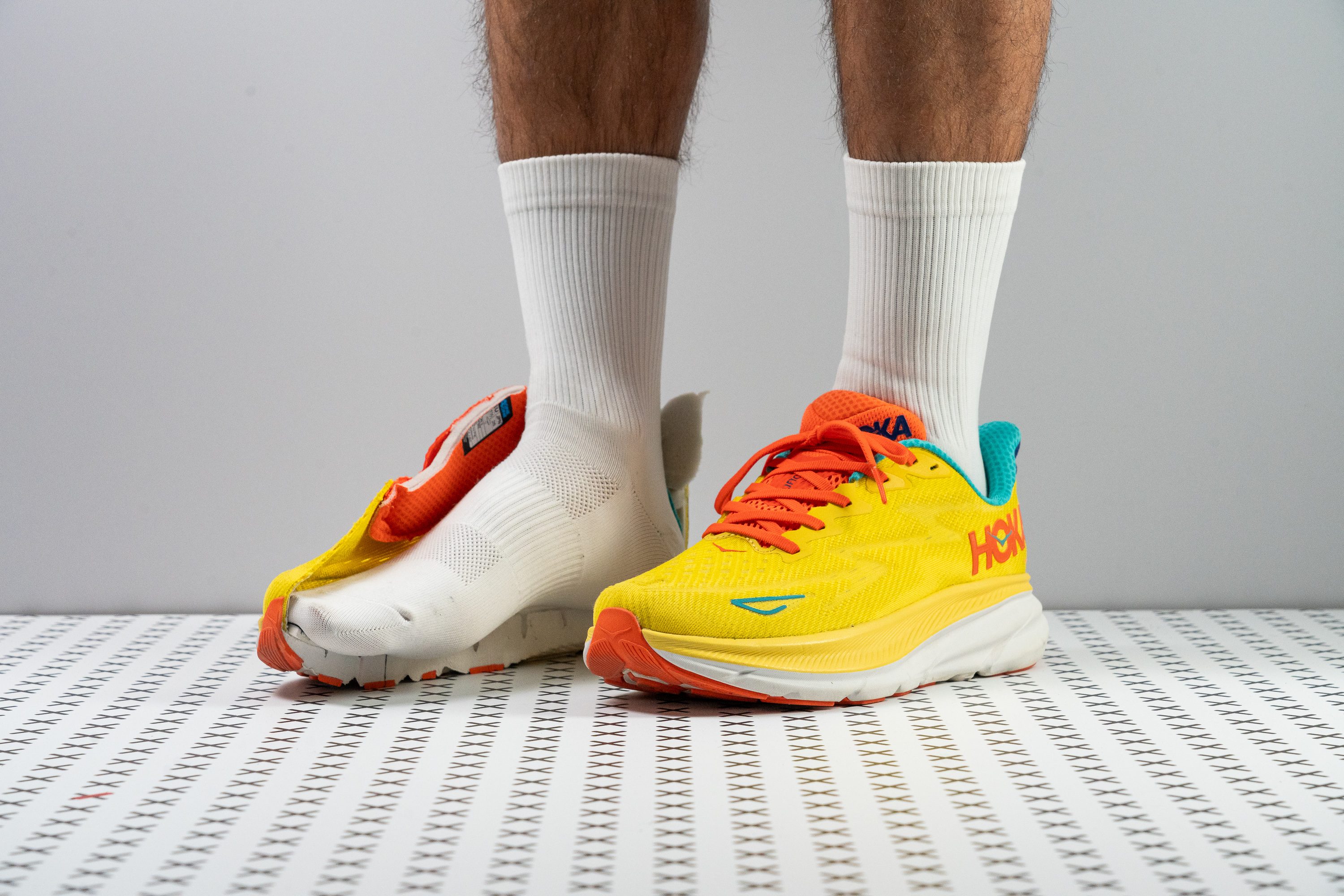Our verdict
- Top pick in best running shoes for beginners (2023)
- Top pick in best cushioned running shoes (2024)
Pros
- Thicker and more energetic midsole cushioning
- Lighter than the v8
- Easy on the knees
- Durable upper
- Available in wide
- Mild, unobtrusive stability elements
- Best for easy days and long runs
- Best for easy days and long runs
- Best for easy days and long runs
Cons
- Snug fit
- Not enough bounce from EVA foam
- Average breathability
- Grip needs improvement
Audience verdict
- Top 1% most popular running shoes
Comparison
The most similar running shoes compared
+ + Add a shoe | |||||
|---|---|---|---|---|---|
| Audience score | 86 Good! | 79 Good! | 88 Great! | 89 Great! | |
| Price | £130 | £65 | £140 | £140 | |
| Pace | Daily running | Daily running | Daily running | Daily running | |
| Shock absorption | Moderate | Moderate | Moderate | High | |
| Energy return | Low | Low | Moderate | Low | |
| Traction | Moderate | Moderate | High | High | |
| Arch support | Neutral | Neutral | Neutral | Neutral | |
| Weight lab Weight brand | 8.8 oz / 249g 8.8 oz / 249g | 9.7 oz / 275g 9.7 oz / 275g | 9.7 oz / 275g 9.8 oz / 277g | 9.7 oz / 275g 9.8 oz / 277g | |
| Lightweight | ✓ | ✗ | ✗ | ✗ | |
| Drop lab Drop brand | 6.1 mm 5.0 mm | 7.8 mm 8.0 mm | 8.5 mm 10.0 mm | 12.4 mm 8.0 mm | |
| Strike pattern | Mid/forefoot | Mid/forefoot | HeelMid/forefoot | Heel | |
| Size | True to size | True to size | True to size | True to size | |
| Midsole softness | Balanced | Balanced | Balanced | Soft | |
| Difference in midsole softness in cold | Small | Small | Small | Small | |
| Toebox durability | - | Bad | Decent | Good | |
| Heel padding durability | - | Good | Decent | Good | |
| Outsole durability | - | Decent | Decent | Decent | |
| Breathability | Moderate | Moderate | Moderate | Moderate | |
| Width / fit | Narrow | Medium | Medium | Medium | |
| Toebox width | Narrow | Medium | Medium | Medium | |
| Stiffness | Stiff | Moderate | Stiff | Moderate | |
| Torsional rigidity | Stiff | Moderate | Moderate | Stiff | |
| Heel counter stiffness | Stiff | Stiff | Stiff | Moderate | |
| Rocker | ✓ | ✗ | ✗ | ✓ | |
| Heel lab Heel brand | 32.7 mm 32.0 mm | 31.2 mm 31.0 mm | 33.6 mm 39.0 mm | 44.4 mm 42.0 mm | |
| Forefoot lab Forefoot brand | 26.6 mm 27.0 mm | 23.4 mm 23.0 mm | 25.1 mm 29.0 mm | 32.0 mm 34.0 mm | |
| Widths available | NarrowNormalWide | NormalWideX-Wide | NormalWide | NarrowNormalWideX-Wide | |
| Orthotic friendly | ✓ | ✓ | ✓ | ✓ | |
| Season | All seasons | All seasons | All seasons | All seasons | |
| Removable insole | ✓ | ✓ | ✓ | ✓ | |
| Ranking | #396 Bottom 42% | #340 Bottom 11% | #137 Top 36% | #97 Top 26% | |
| Popularity | #5 Top 1% | #70 Top 19% | #54 Top 15% | #2 Top 1% |
Who should buy
Get this all-around Hoka workhorse if you:
- Are looking for a cushioned road runner that can comfortably gobble miles.
- Want a Clifton that can easily handle easy days, recovery runs, and some speedwork.
- Need excellent value for money. As a premium daily trainer, the Clifton 9 is more affordable than its competition, i.e. Saucony Triumph 20 (£160).
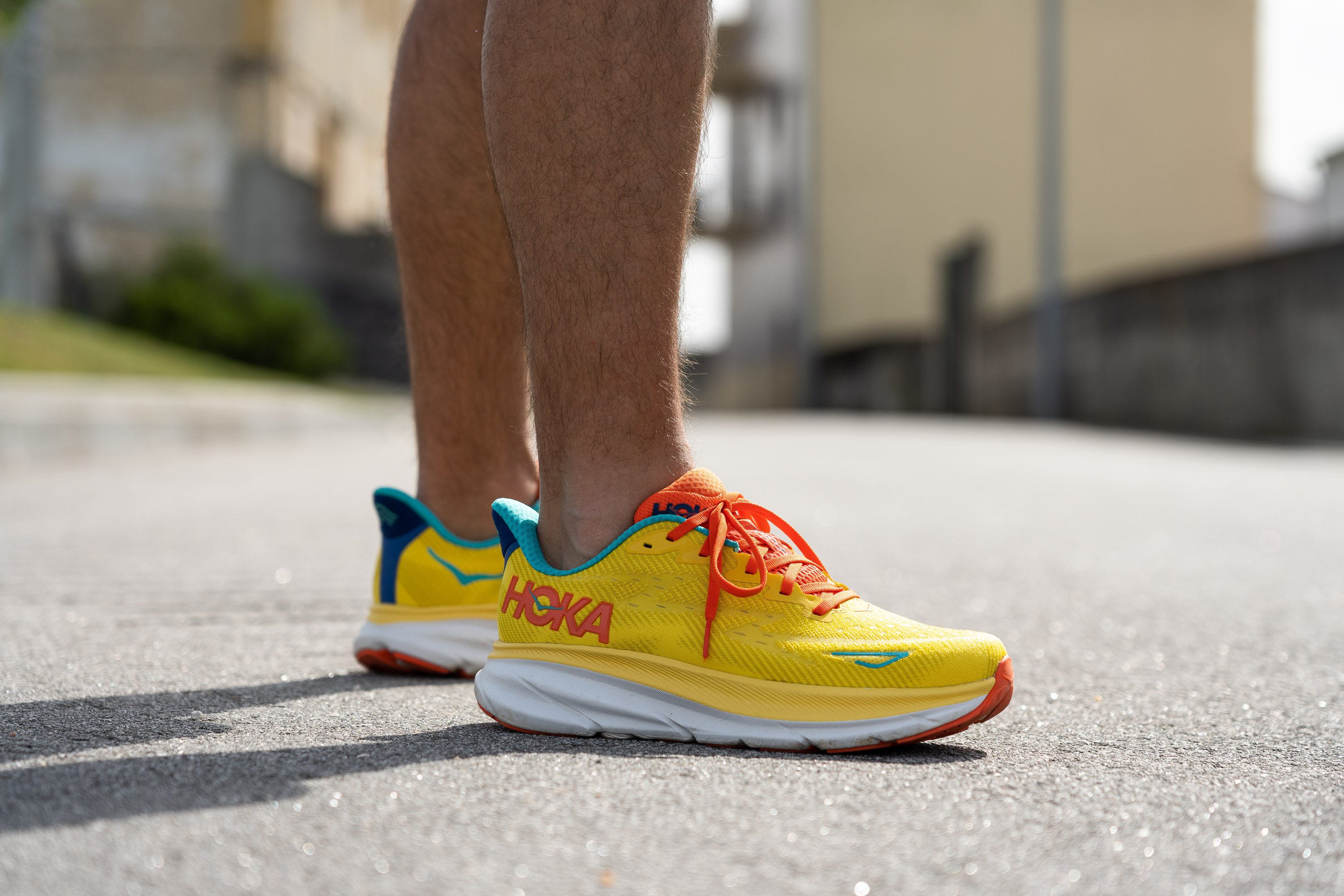
Who should NOT buy
While the Clifton 9 comes up wider than any of its predecessors, it still has that narrow-leaning Hoka fit. If you have wide feet and are worried even the wide sizes aren’t enough, check out the Nike ZoomX Invincible Run 3.
For another daily trainer that’s comfy, cushy, and good to go from day one, look at the Saucony Triumph 20. It is also much more breathable.
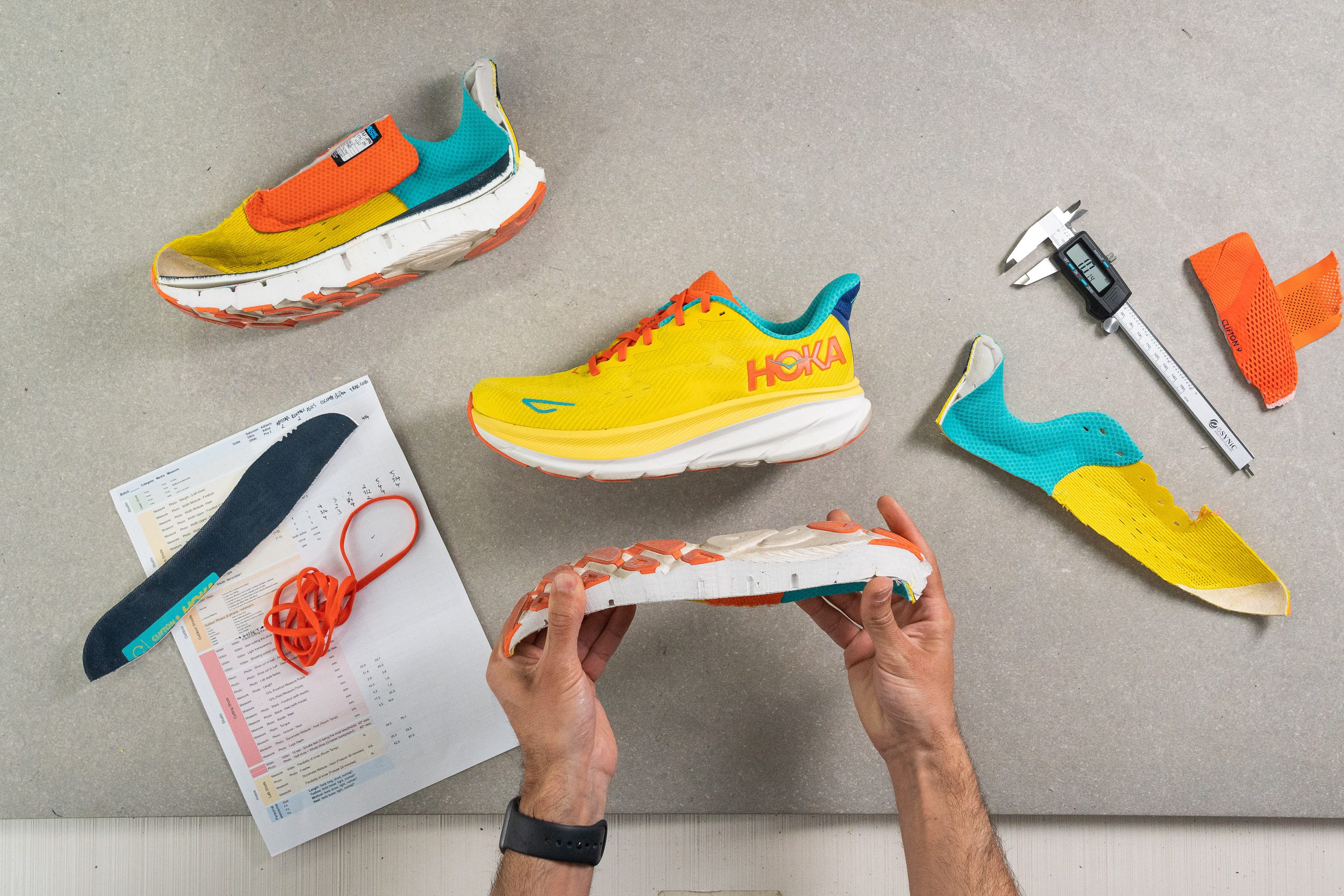
Cushioning
Shock absorption
The Clifton 9 is a daily trainer built to rival models like the Nike Pegasus and Adidas Supernova, so it’s no surprise that it delivers balanced, all-purpose shock absorption. We measured 127 SA, right in the sweet spot for broad appeal.
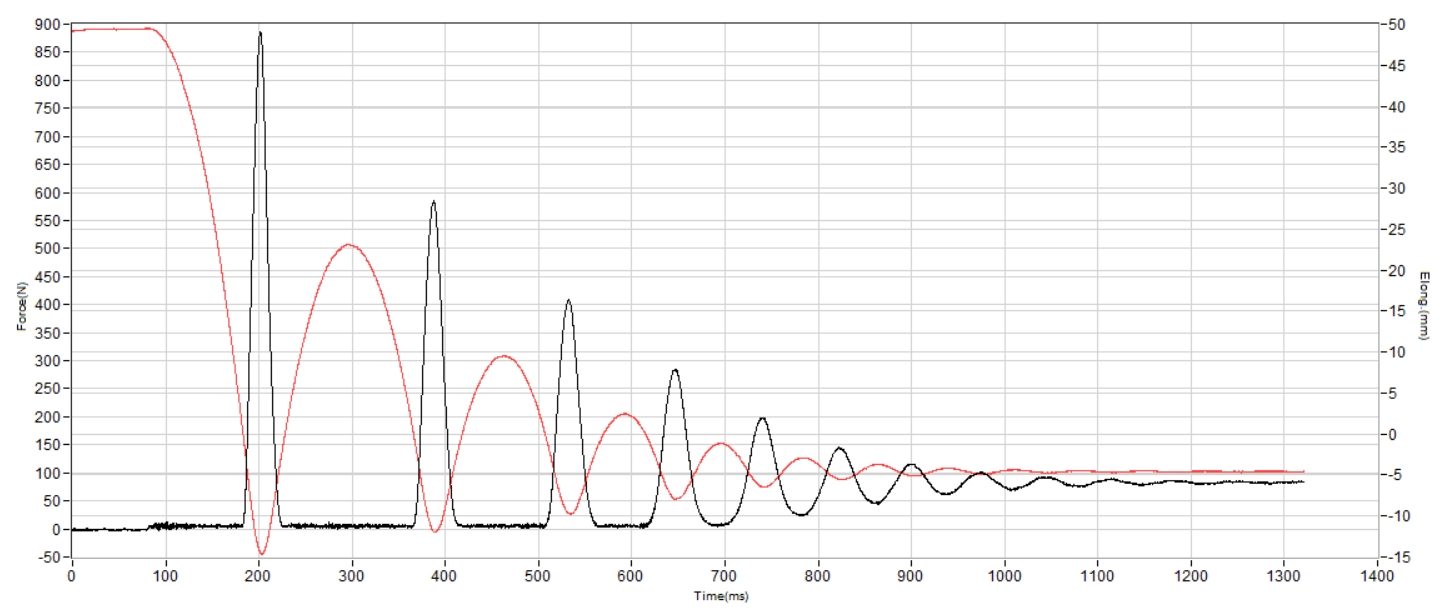
| Hoka Clifton 9 | 127 SA |
| Average | 130 SA |
Energy return
Where we saw clear room for improvement was in energy return. At just 53%, the result isn’t terrible, but definitely underwhelming for a modern running shoe. We were hoping for a bit more bounce.
| Hoka Clifton 9 | 53.0% |
| Average | 58.6% |
Heel stack
Back to the Clifton 7 stack height.
Seeing 32.7 mm on our calliper, we were really happy about Hoka's choice to add an extra 3 millimetres to the stack height. Those same 3 mm were there in the Clifton 7 but disappeared in the Clifton 8.
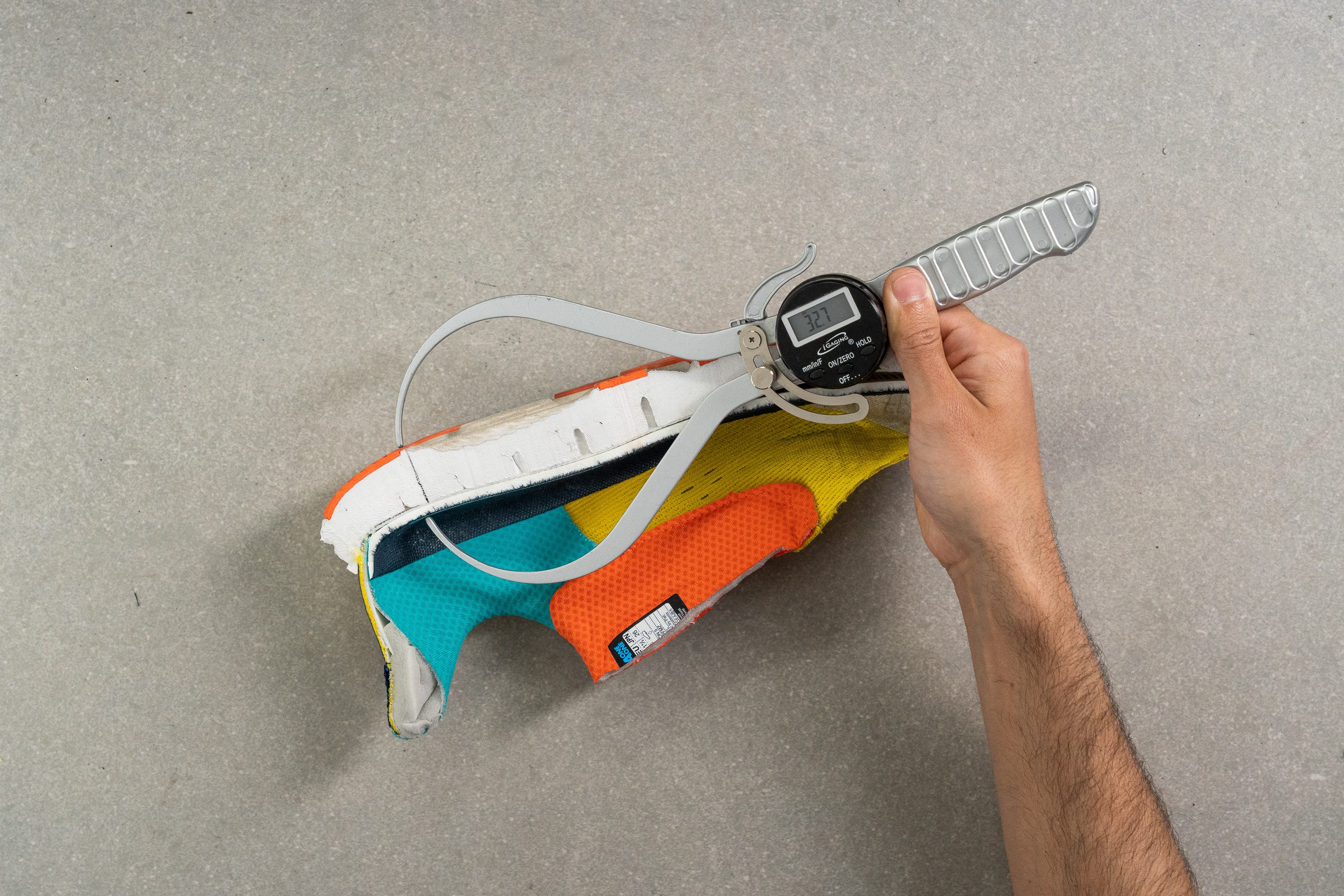
That way, this Hoka shoe sits at the average of road shoes in terms of cushioning thickness.
| Hoka Clifton 9 | 32.7 mm |
| Average | 34.8 mm |
Forefoot stack
Upfront in the forefoot, our calliper returned 26.6 mm. This is a couple of millimetres taller than the average offering a little bonus for midfoot and forefoot strikers out there.
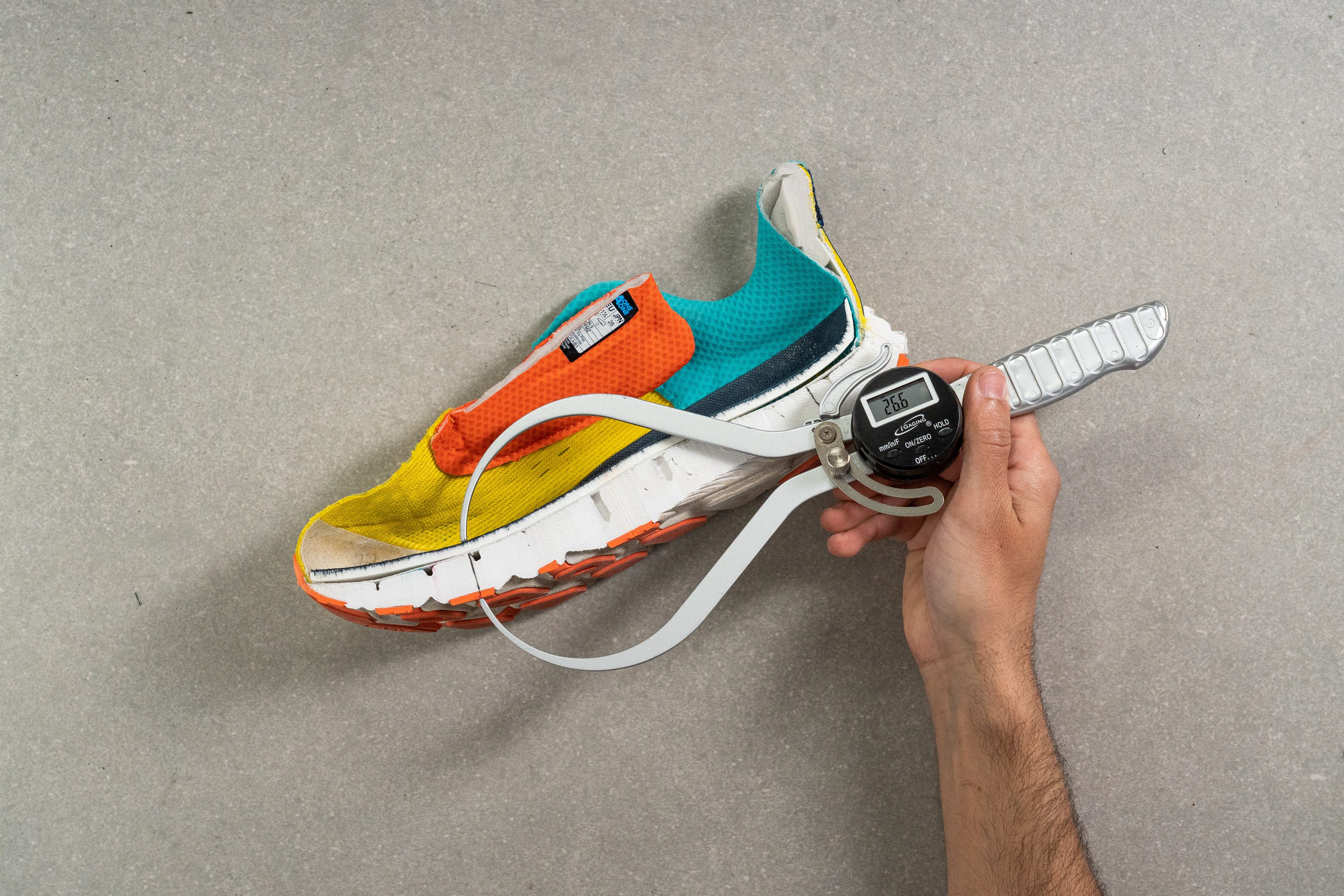
| Hoka Clifton 9 | 26.6 mm |
| Average | 26.2 mm |
Drop
The company states that the shoe's stack height is 32/27 mm, featuring a 5 mm heel-to-toe drop. Our measurements came in at 32.7 mm and 26.6 mm resulting in a 6.1 mm drop, which is fairly close to their claim. Bravo!
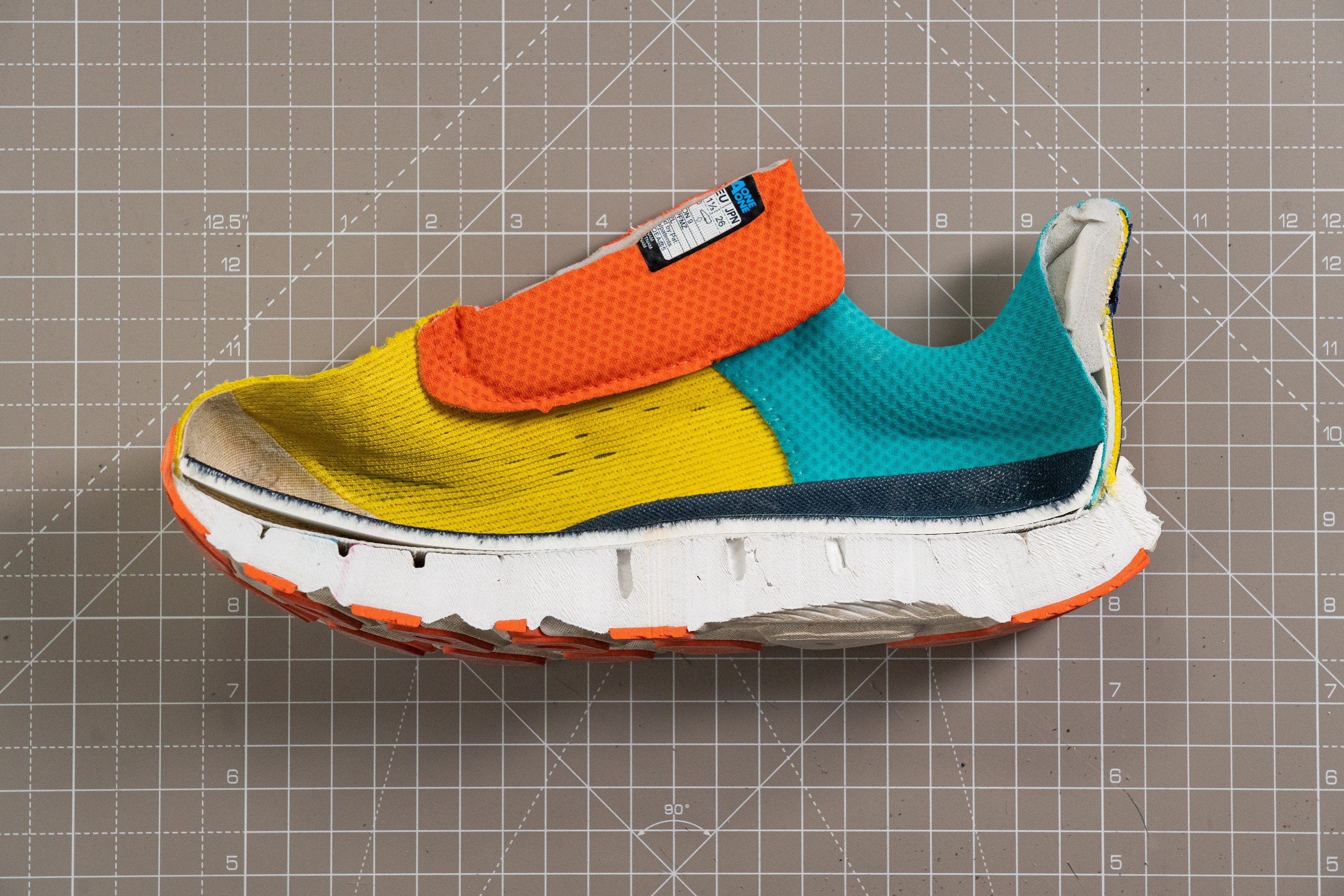
| Hoka Clifton 9 | 6.1 mm |
| Average | 8.6 mm |
Midsole softness
NewThe biggest headline in the Clifton 9 is its “new” ProFly+ midsole foam—it's a similar foam to the Clifton 8 but with a slightly different formulation.
Our lab measurements confirmed that it delivers a firm underfoot sensation, posting a 40.5 AC reading on our Asker C durometer.
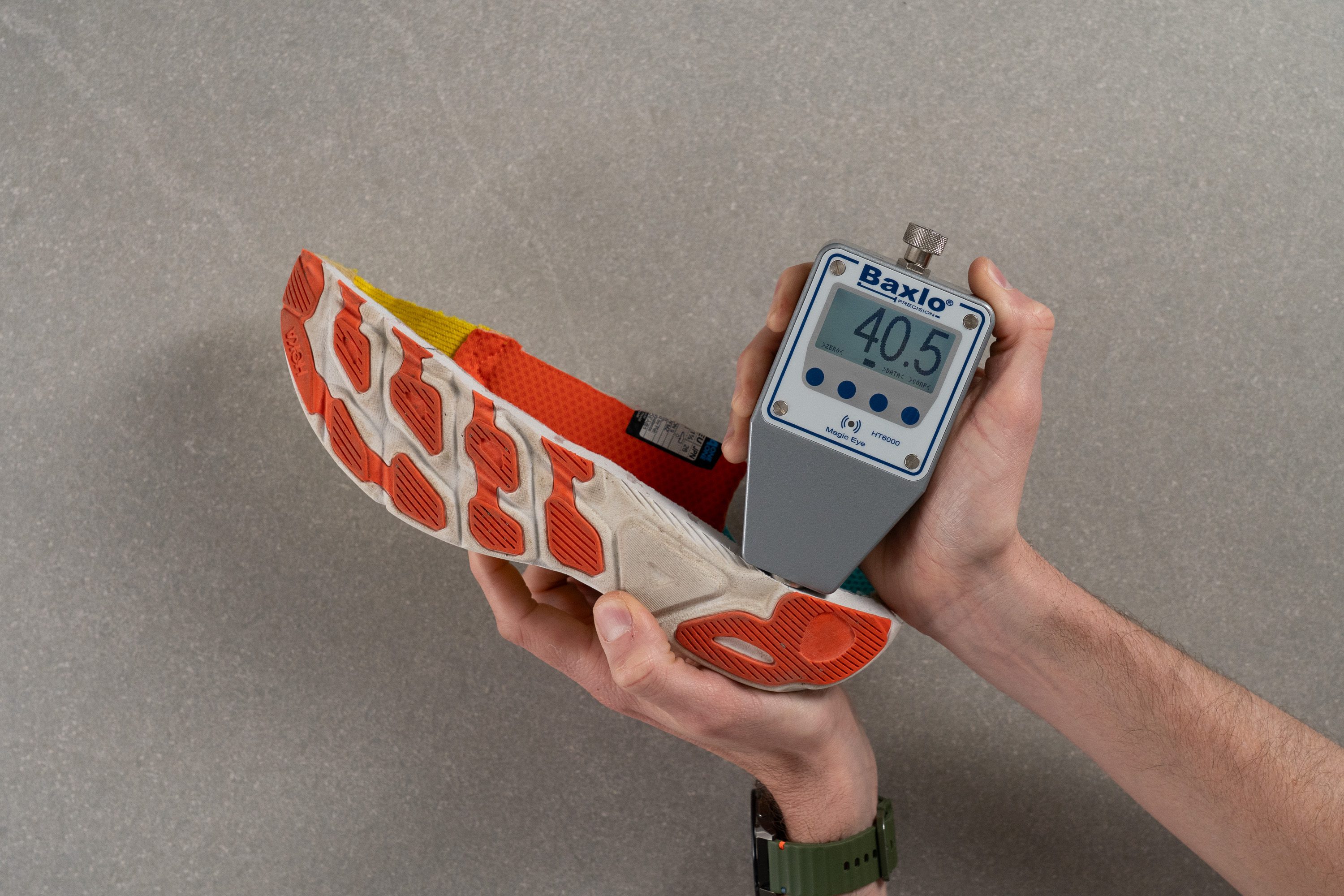
| Hoka Clifton 9 | 40.5 AC |
| Average | 36.2 AC |
Rocker
While the Clifton 9 isn't as heavily rockered as the New Balance SC Trainer featured in the video below, its curved design will aid you in every heel-to-toe transition. This is particularly noteworthy for heel strikers, considering the relatively low drop.
Compared to version 8, this ninth edition felt more alive to us. The new midsole gave the shoe a more energetic ride, and the meta-rocker was balanced and easy to get in sync with.
Ride
While its updates allowed the shoe to pick up some workout paces, we still think that this Hoka shoe simply doesn't have enough bounce to sustain fast paces efficiently.
The Clifton 9 is better suited for clocking up the miles and forgetting all about speed. It might not be the best choice for faster-tempo runs and more intense activities.
Size and fit
Size
Hoka Clifton 9 fits true to size (1941 votes).
Width / Fit
The Clifton 9 provides an overall snug fit, though the slightly broader midfoot gives a deceptive sense of extra room. To better understand its design, we created a custom gel mould, allowing us to perform precise measurements here in the lab.
The first measurement, taken at the widest point, revealed just 92.2 mm. This result confirms that the shoe is narrower than average.
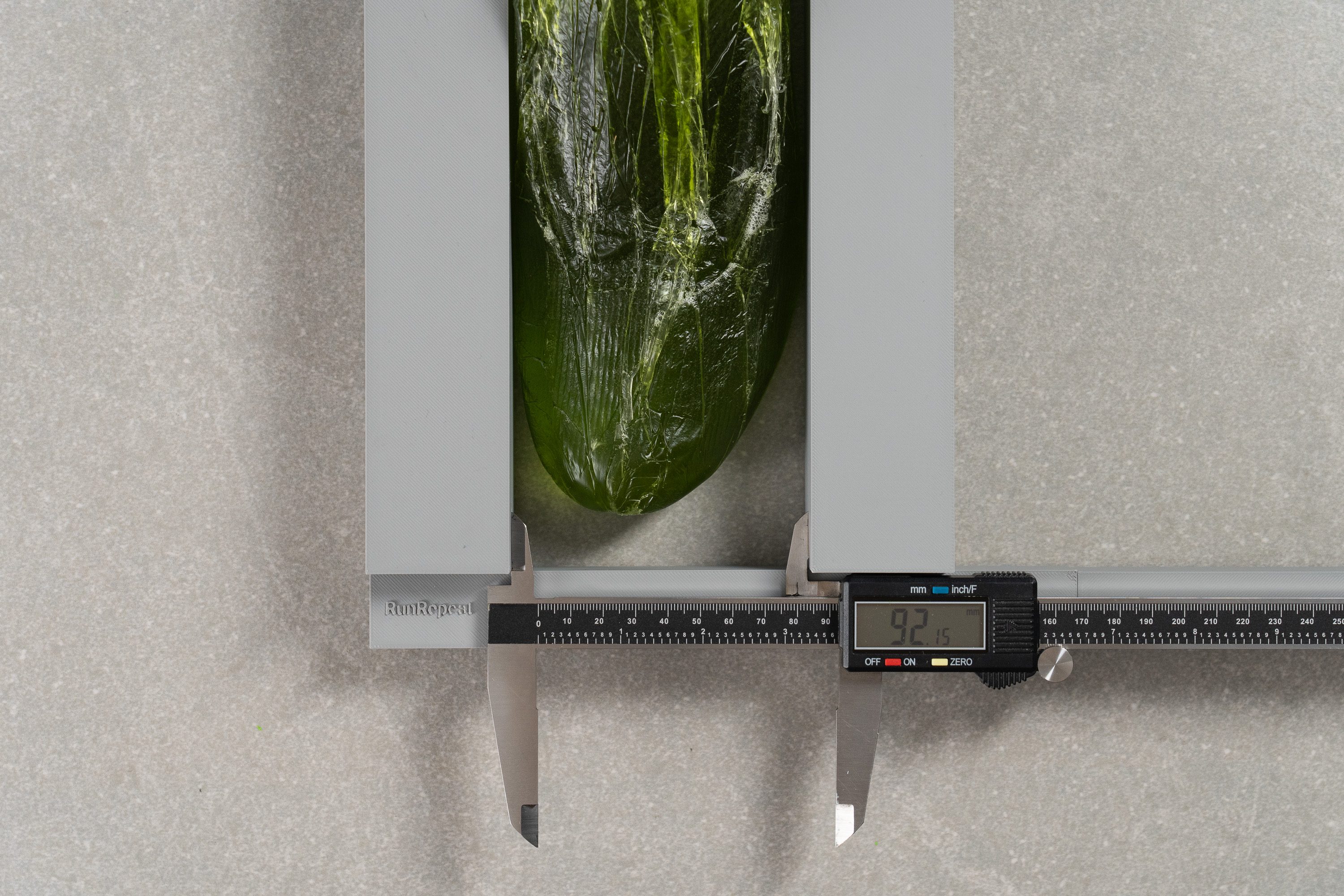
| Hoka Clifton 9 | 92.2 mm |
| Average | 95.1 mm |
Toebox width
Our second measurement truly revealed the truth of the Clifton 9’s fit—just 68.9 mm, making it one of the rare shoes in our lab to dip below the 70-mm mark.
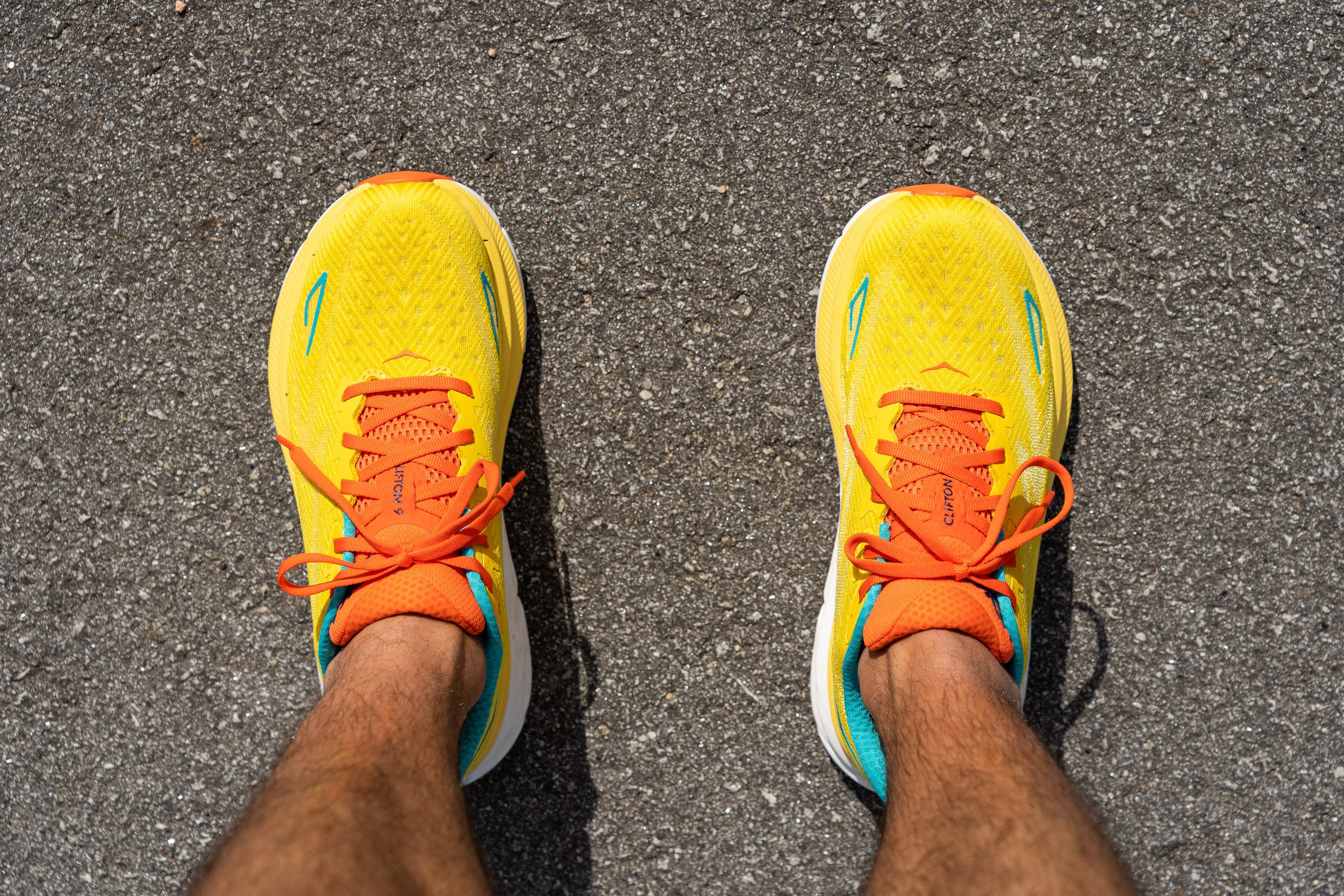
In our view, this strong taper caters exclusively to those with narrow feet, who may find the Clifton 9’s narrow toe area a perfect match. However, for most runners, the tight fit and aggressive tapering (characteristic of many Hoka shoes) leave much to be desired. The shape is as far as it can be from an anatomical or foot-shaped design.
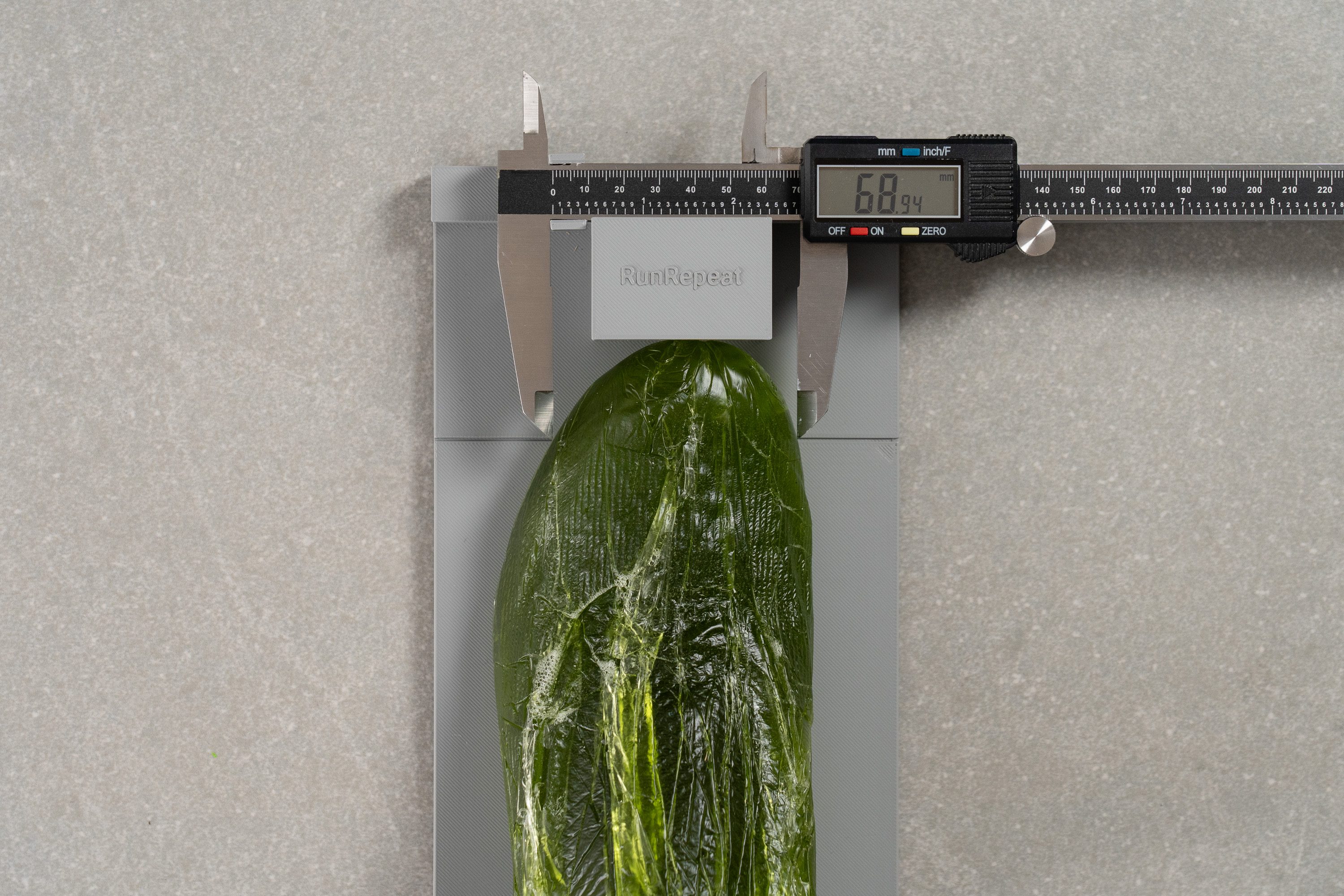
| Hoka Clifton 9 | 68.9 mm |
| Average | 73.3 mm |
Toebox height
We discovered that the Clifton 9 provides noticeably more vertical room than most shoes we’ve measured in the lab, with a height of 28.9 mm. From our evaluation, that's ideal for women who tend to point their toes upward.
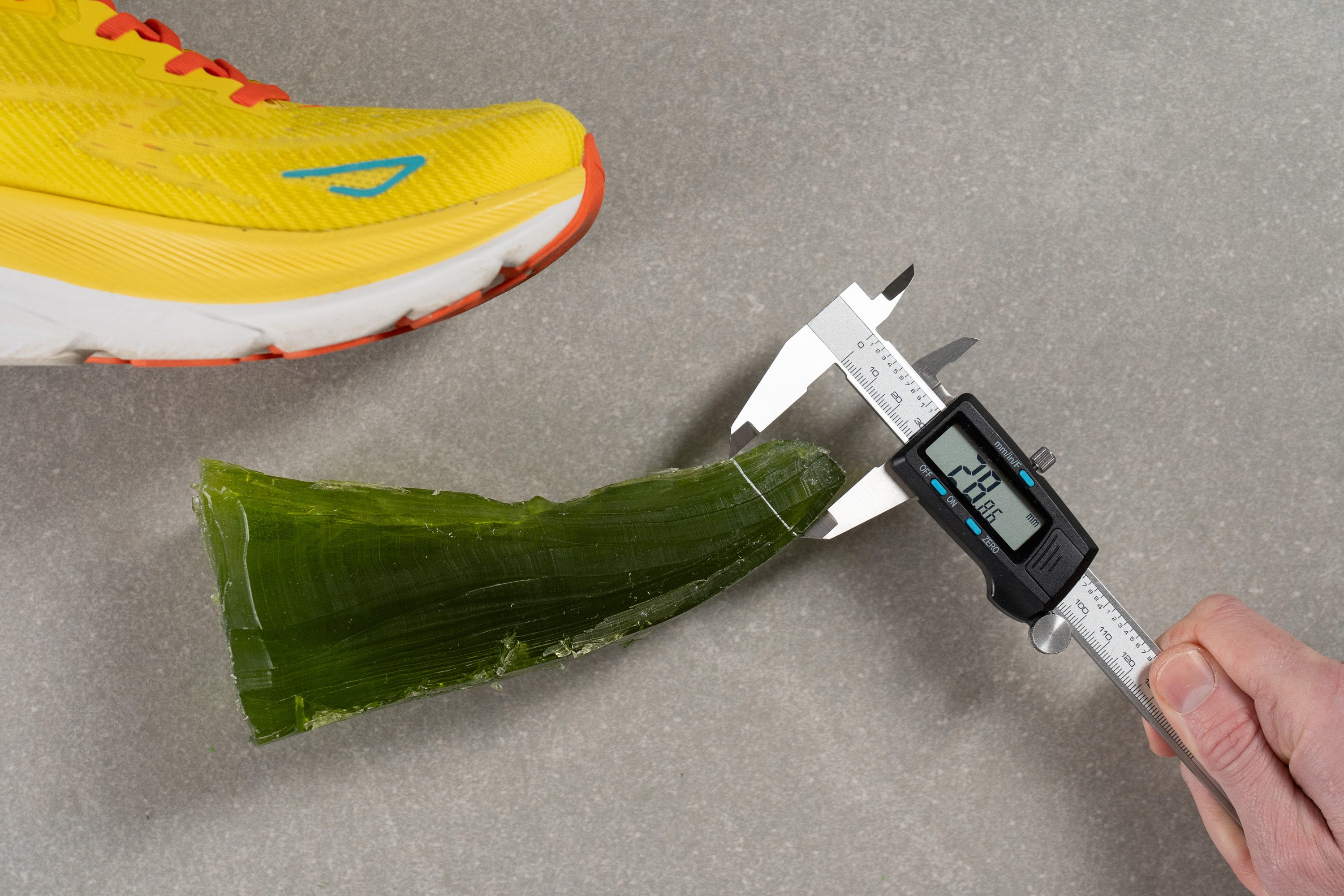
| Hoka Clifton 9 | 28.9 mm |
| Average | 27.0 mm |
Traction / Grip
Based on our wear tests, the shoe's traction underfoot is pretty good for a road shoe. We've had no problems on light trails and even grass.
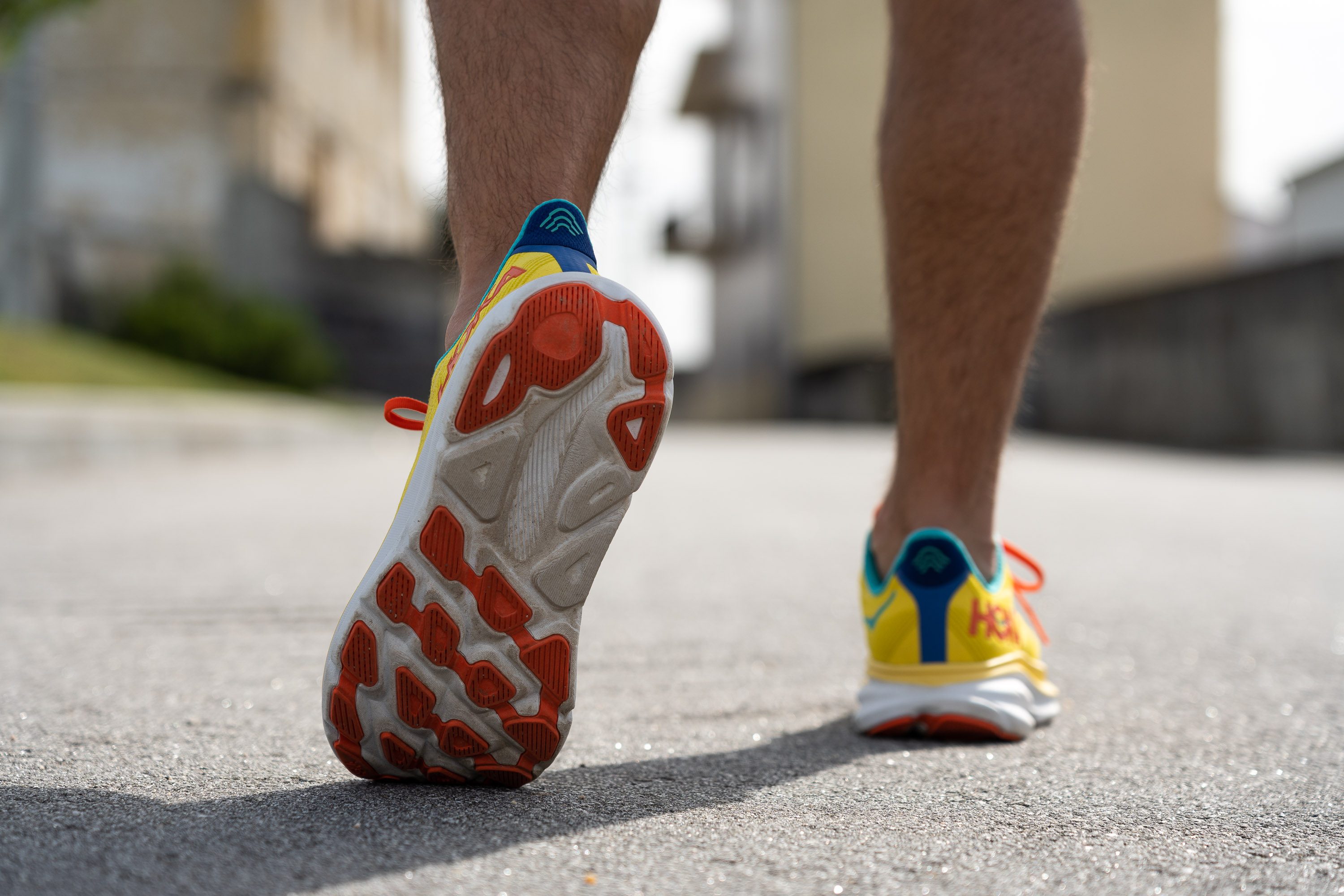
Traction test
One of the weakest links in the Clifton 9 is its outsole. After we ran it through our wet-condition test, the shoe scored just 0.33, placing it below most daily trainers in terms of wet grip.
On dry pavement, it feels secure enough for everyday miles, but as soon as the roads turn slick or muddy, its grip quickly fades. For runners dealing with rainy weather or off-road detours, we think that the ASICS Superblast 2 is a much better alternative.
| Hoka Clifton 9 | 0.33 |
| Average | 0.49 |
Outsole design
The Clifton 9 features a smartly-placed rubber outsole that prioritises durability without adding too much weight. HOKA focused on high-impact areas like the heel and forefoot, while keeping the midfoot exposed to save grammes. In our view, it strikes a great balance for daily training.

Flexibility / Stiffness
We turned on our custom-made machine to measure how much force it would take to bend the HOKA Clifton 9 to a 30-degree angle. As it turns out, it required slightly more than the average!
The machine stopped at 17.7N, which is definitely stiffer than most competitors—likely due to the oversized midsole and its thick, supportive midfoot area.
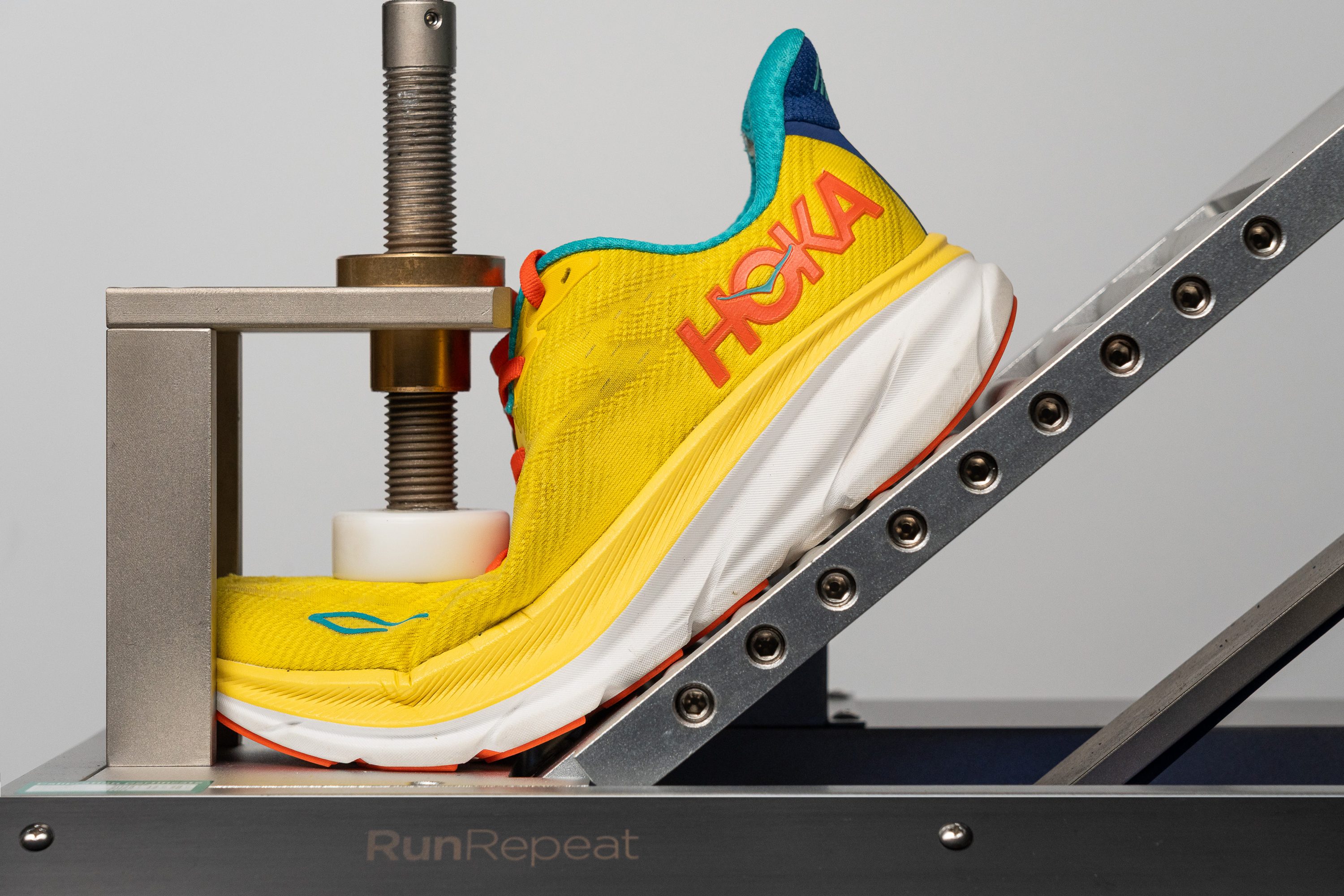
| Hoka Clifton 9 | 17.7N |
| Average | 15.3N |
Stiffness in cold (%)
Unfortunately, the Hoka Clifton 9 becomes disappointingly stiffer when exposed to cold temperatures!
After sitting for 20 minutes in the freezer, this Hoka shoe asked for as much as 48.9N of force to bend it! That's way above the average!
Getting 81.8% stiffer in freezing temperatures compared to the average 43.6% is too much!
| Hoka Clifton 9 | 82% |
| Average | 33% |
Weight
Despite having a thicker stack than the v8, the Hoka Clifton 9 still comes in at a surprisingly lighter weight overall.
At just 8.8 oz (249g), the Clifton 9 weighs 0.7 oz (20g) lighter than your average road running shoe!
| Hoka Clifton 9 | 8.8 oz (249g) |
| Average | 9.3 oz (264g) |
Breathability
Even though the Clifton 9's upper felt really soft and cosy against the foot, we found that breathability was not that good.
Sadly, we had to rate the shoe a 3 out of 5 on our breathability test, which is below the average for road running shoes. In addition, you can see from our transparency test below, how the shoe's ventilation holes are built into a really thick upper material.
This score aligns with our microscopic examination, where we observed a dense mesh layer combined with small openings and thinner sections to promote airflow.
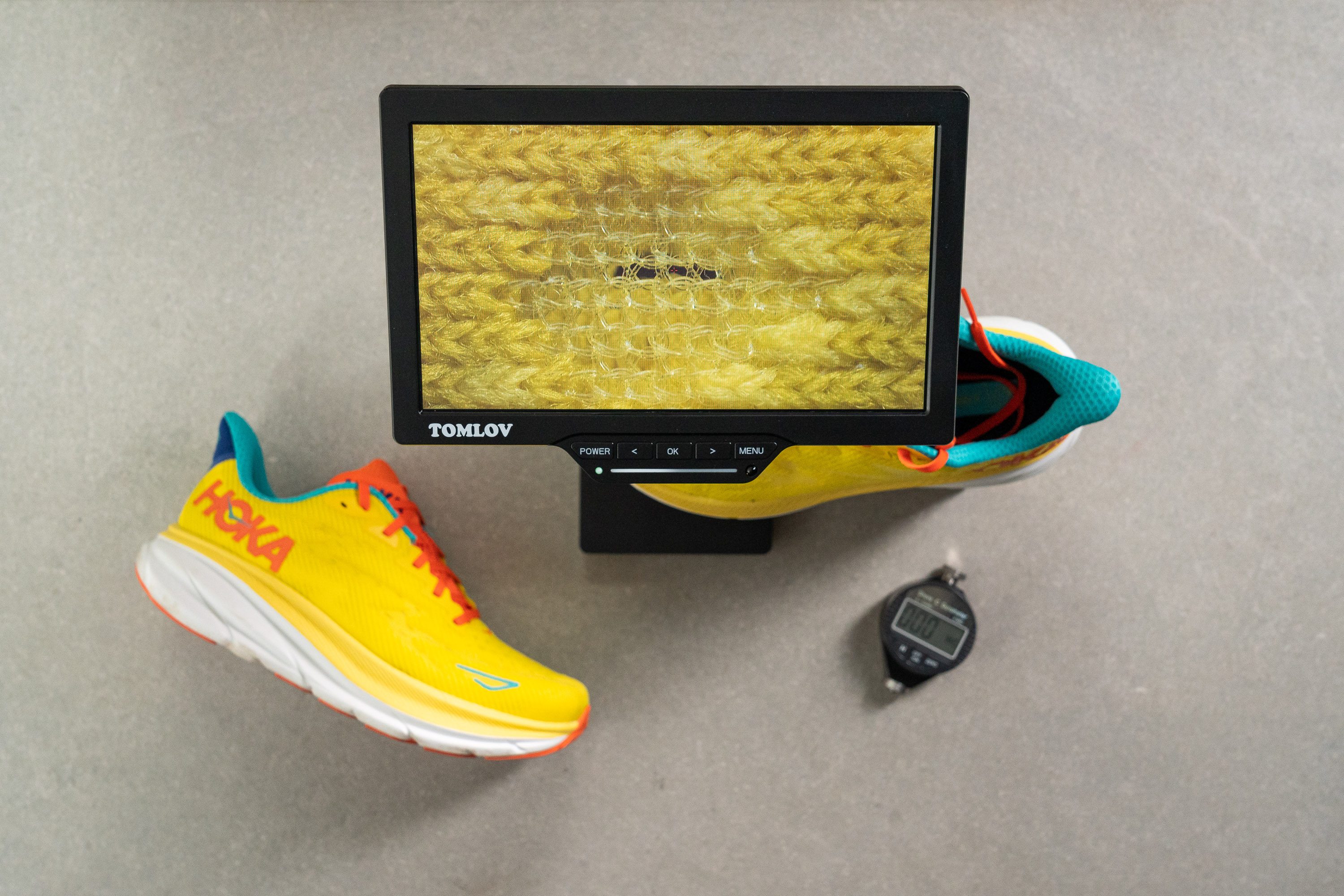
Sporting moderate breathability, it might not be the top choice for sweltering summer long runs. However, these little holes ensure sufficient airflow for nearly every day of the year.
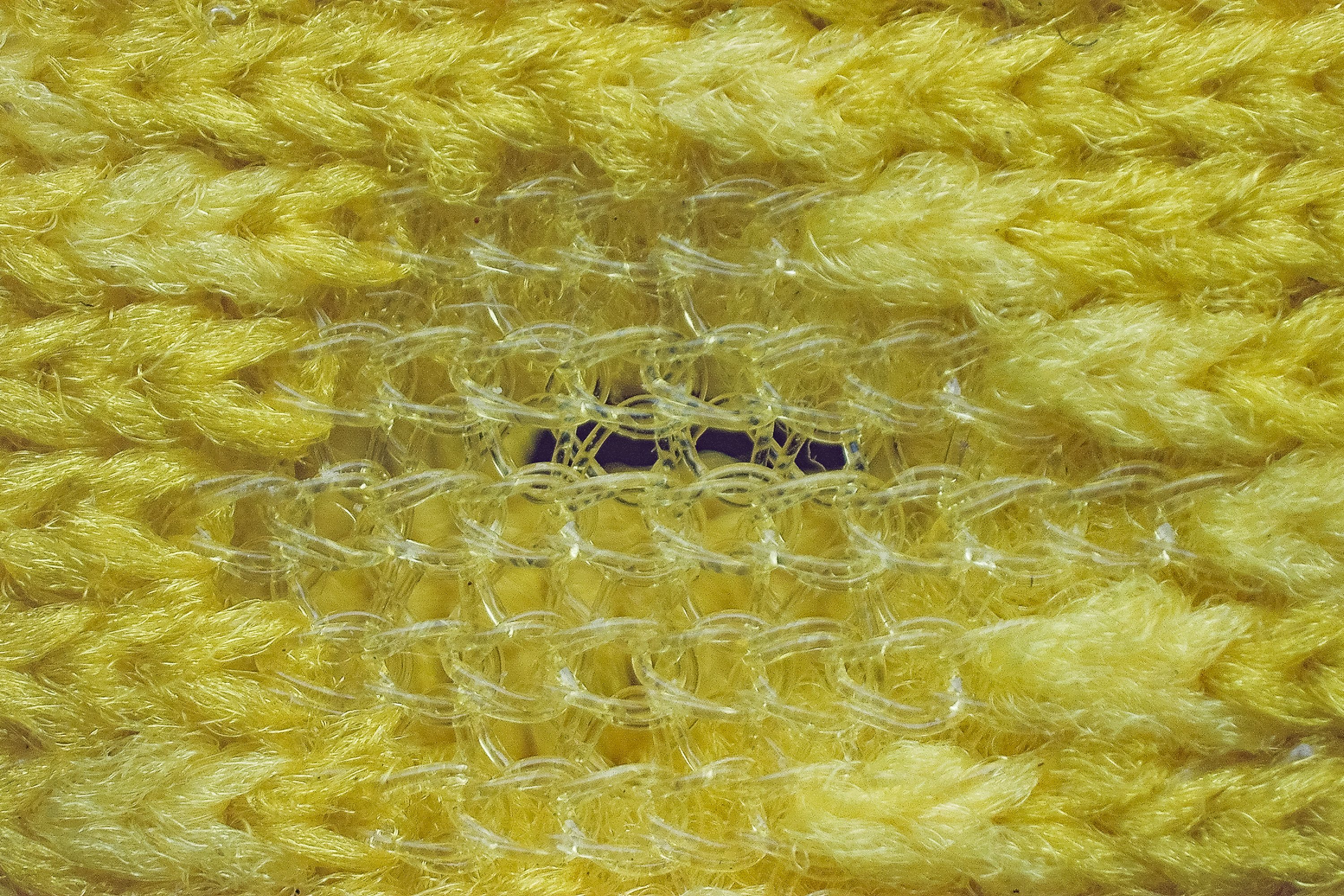
| Hoka Clifton 9 | 3 |
| Average | 3.7 |
Stability
Lateral stability test
Despite having no motion control features or special support in the upper, we think that the Clifton 9 could work for runners with mild overpronation. It is also a lifesaver for neutral pronators who love a touch of support as they get towards the end of the run.
Torsional rigidity
First of all, the shoe is stiff enough to provide a stable platform to land on and push off from.
In our hands-on evaluation, we rated the shoe on a 1-5 stiffness scale, with 5 being the stiffest. It scored 4 out of 5 for torsional stiffness.
This level of rigidity prevents the shoe's platform from rolling sideways easily.
| Hoka Clifton 9 | 4 |
| Average | 3.5 |
Heel counter stiffness
Hoka is famously recognised for its robust and rigid heel counters, and this shoe is just another example.
The Clifton 9's heel counter is among the stiffest we've ever rated! We awarded it with the highest score 5 out of 5!
But where this shoe truly excels is in providing support for the Achilles region. If you're prone to tendinopathies or have a sensitive Achilles area, the curved heel cup design is perfect for you.
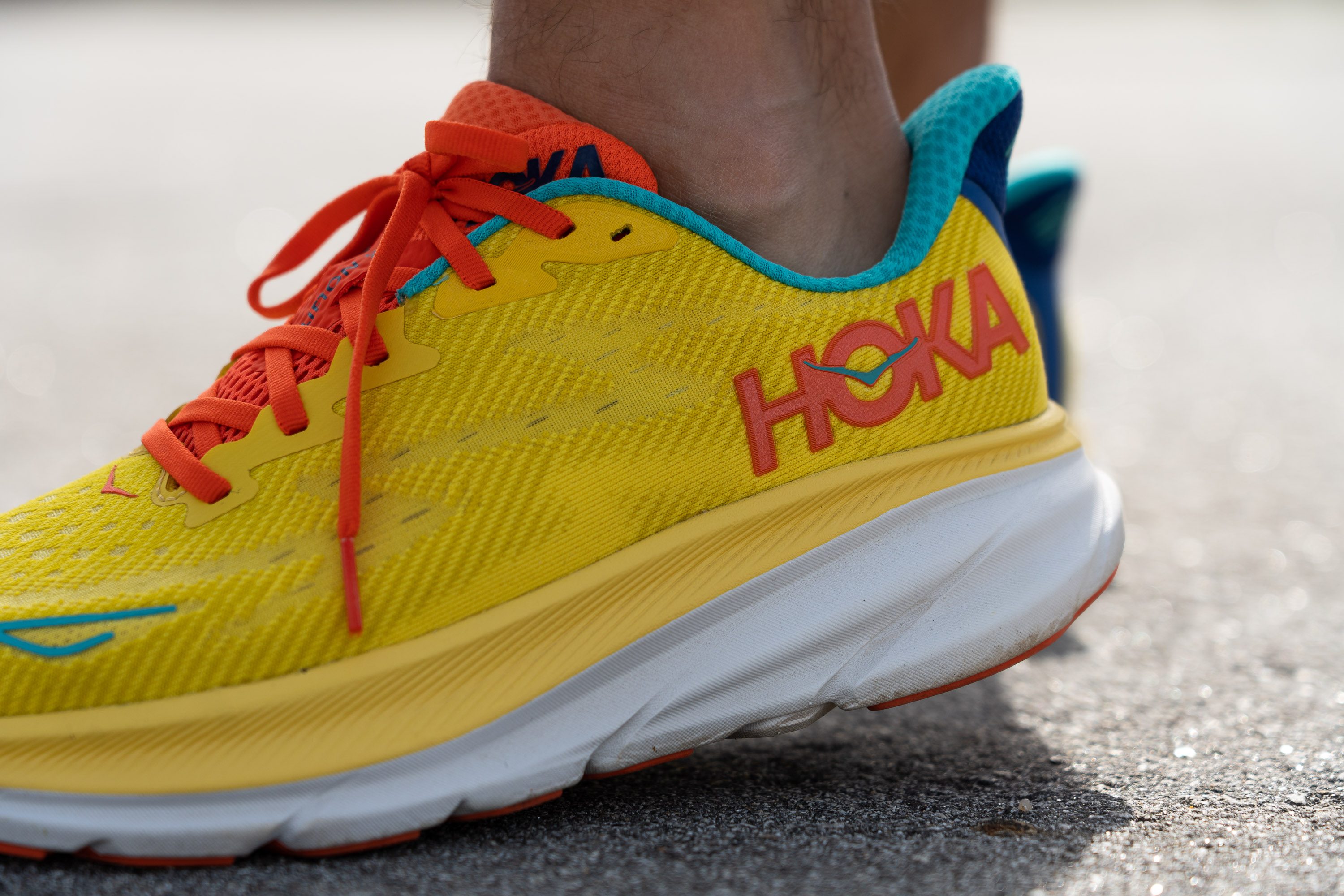
Unlike many other shoes that press against your tendon, this one moves away from it, avoiding any unnecessary tension. This could be a game-changer for many runners.
| Hoka Clifton 9 | 5 |
| Average | 2.9 |
Midsole width - forefoot
Hoka shoes are known for having broad platforms that enhance stability, and the Clifton 9 certainly follows suit.
With the help of a calliper, we found an impressive 115.3 mm in the widest part of the forefoot. This is a couple of millimetres wider than the average.
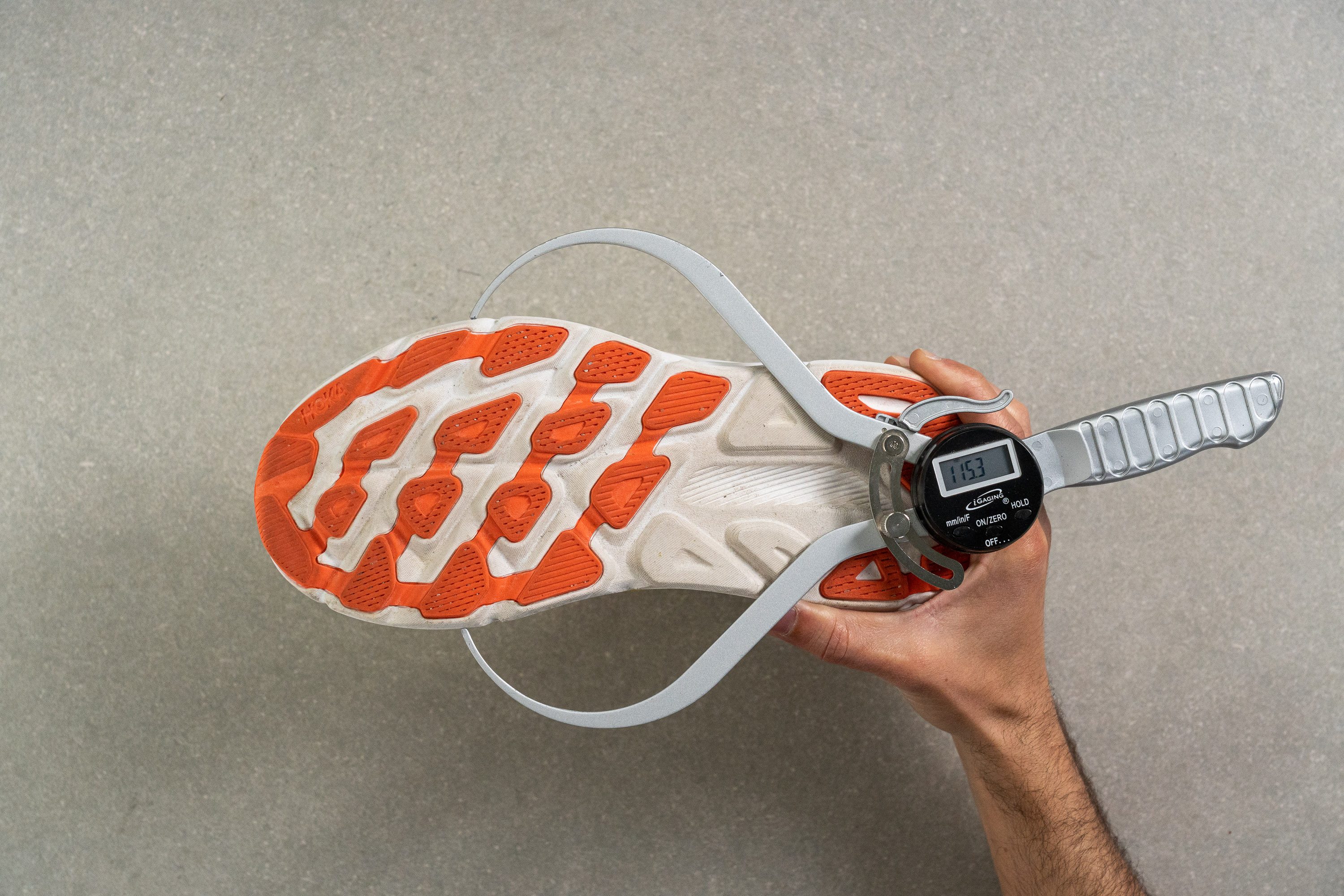
| Hoka Clifton 9 | 115.3 mm |
| Average | 114.4 mm |
Midsole width - heel
In the widest part of the heel, our calliper showed a striking 96.0 mm! That's a good 6 mm wider than average and is certainly among the widest we've seen in our lab.
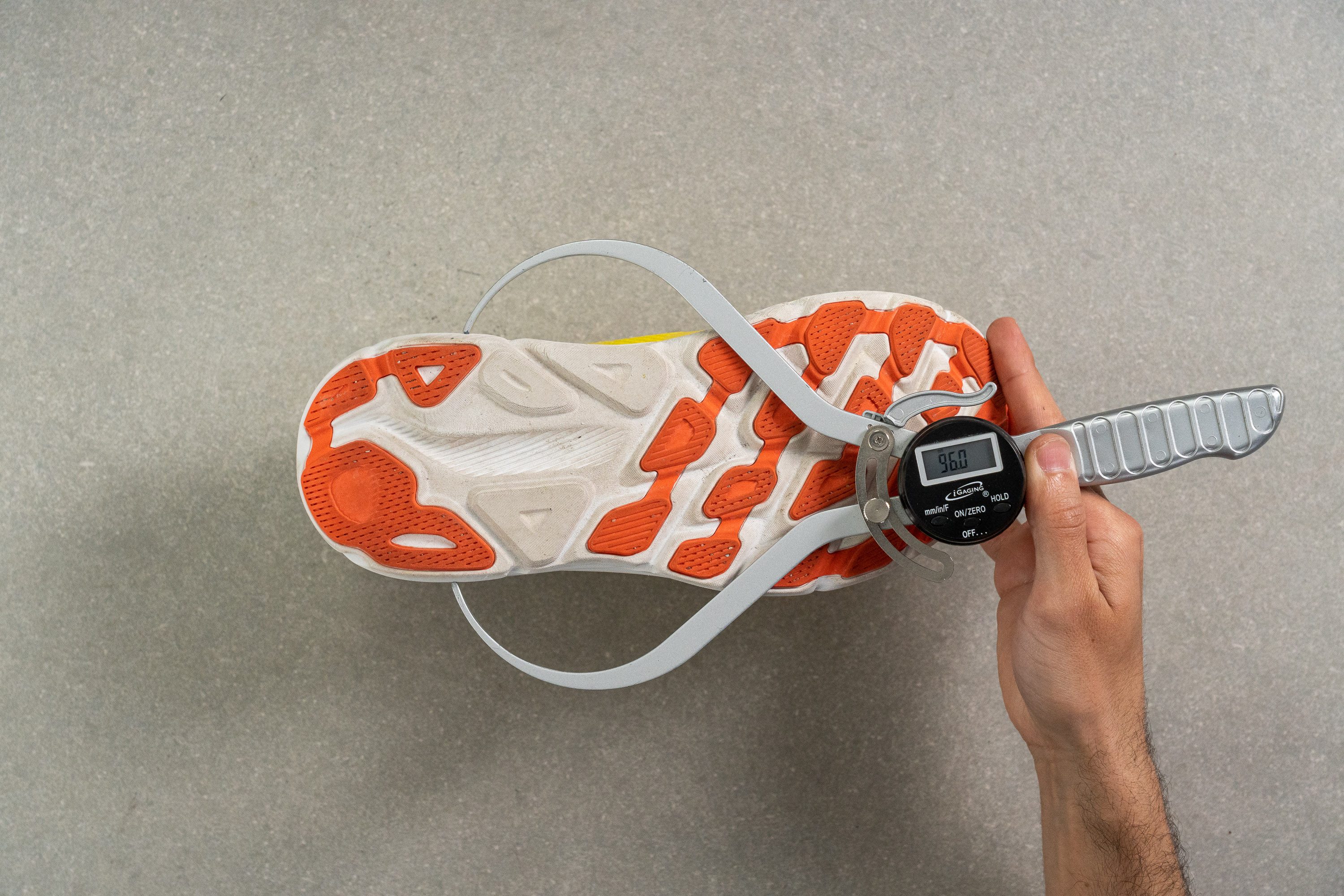
| Hoka Clifton 9 | 96.0 mm |
| Average | 90.6 mm |
Durability
Outsole hardness
From our experience, softer rubbers tend to fall behind harder compounds in terms of wear resistance. Unfortunately, our durometer measurement showed that this Hoka shoe's outsole is a little softer than average at 76.0 HC.
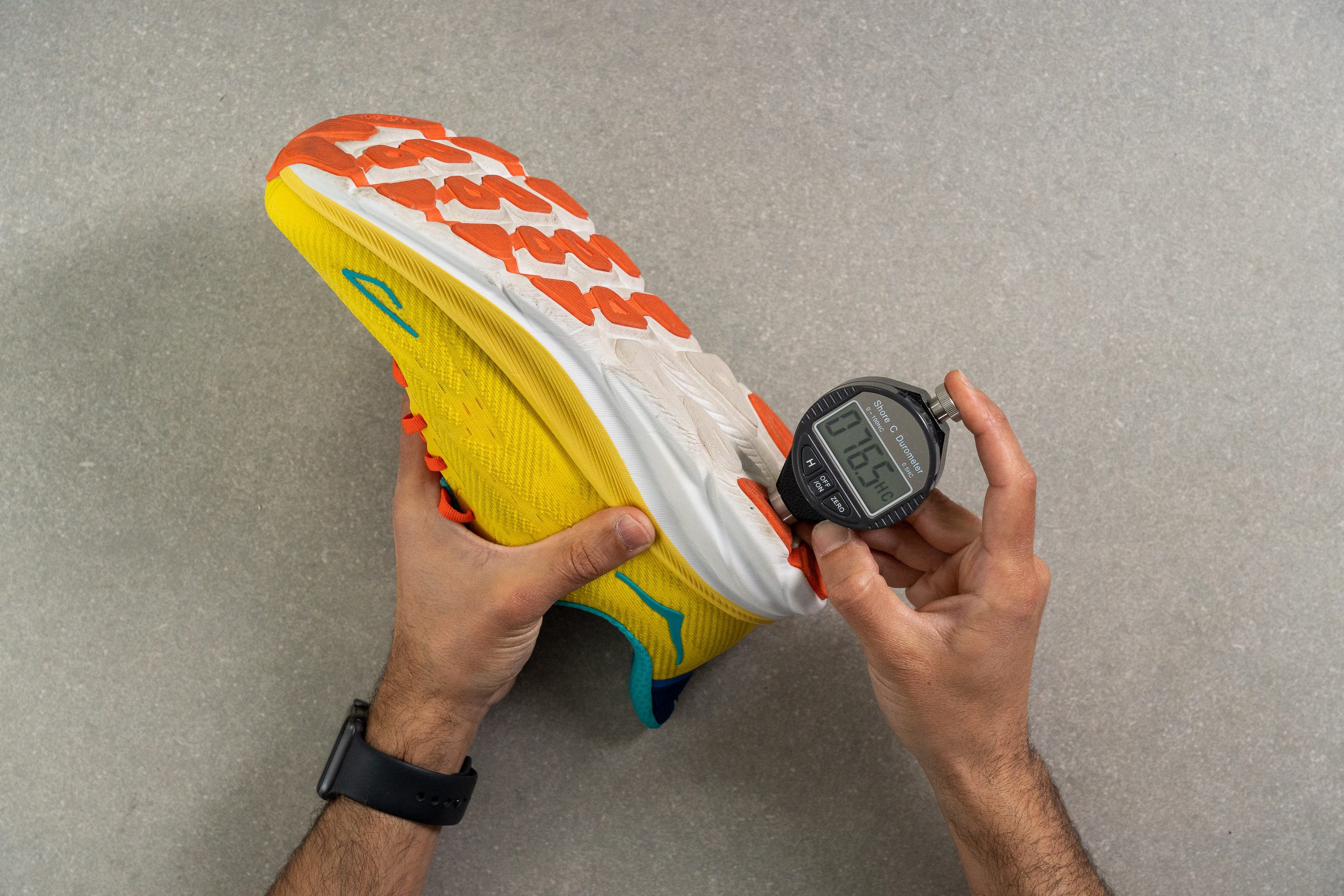
But after a series of test runs, it wasn't as bad as we had expected!
| Hoka Clifton 9 | 76.0 HC |
| Average | 79.2 HC |
Outsole thickness
The Clifton's durability is saved by its thicker-than-usual outsole layer! With a calliper measurement of 3.7 mm, the rubber on this shoe is slightly thicker than average.
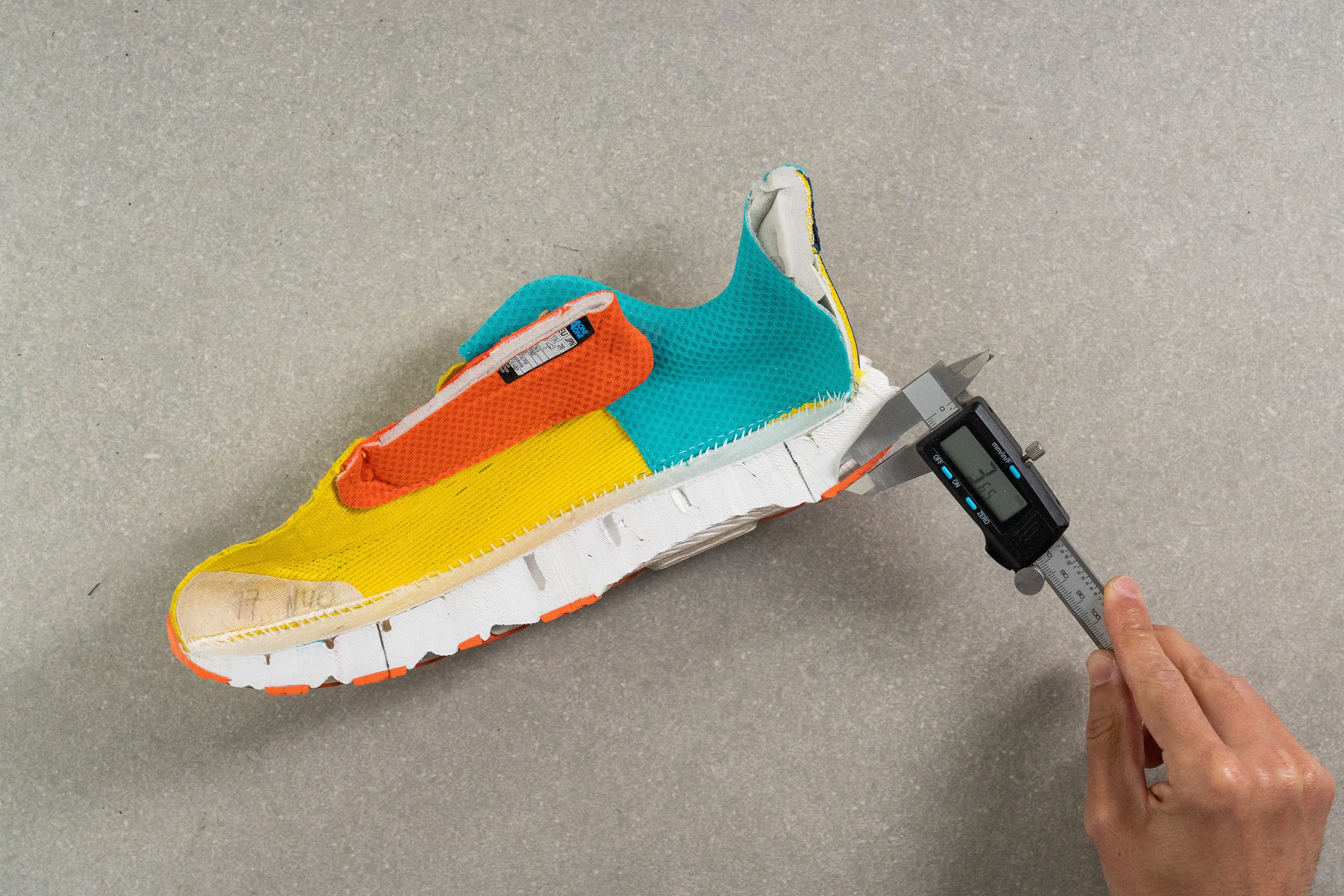
This approach is great, as it would have been easier to use less, harder rubber, saving weight while maintaining durability. In return, the shoe's softer rubber helps to keep landings less harsh.
| Hoka Clifton 9 | 3.7 mm |
| Average | 3.2 mm |
Misc
Insole thickness
Hoka opted for a fairly standard, padded insole for the Clifton 9. Measuring its thickness in the heel, we got 4.2 mm. Same as the average, actually.
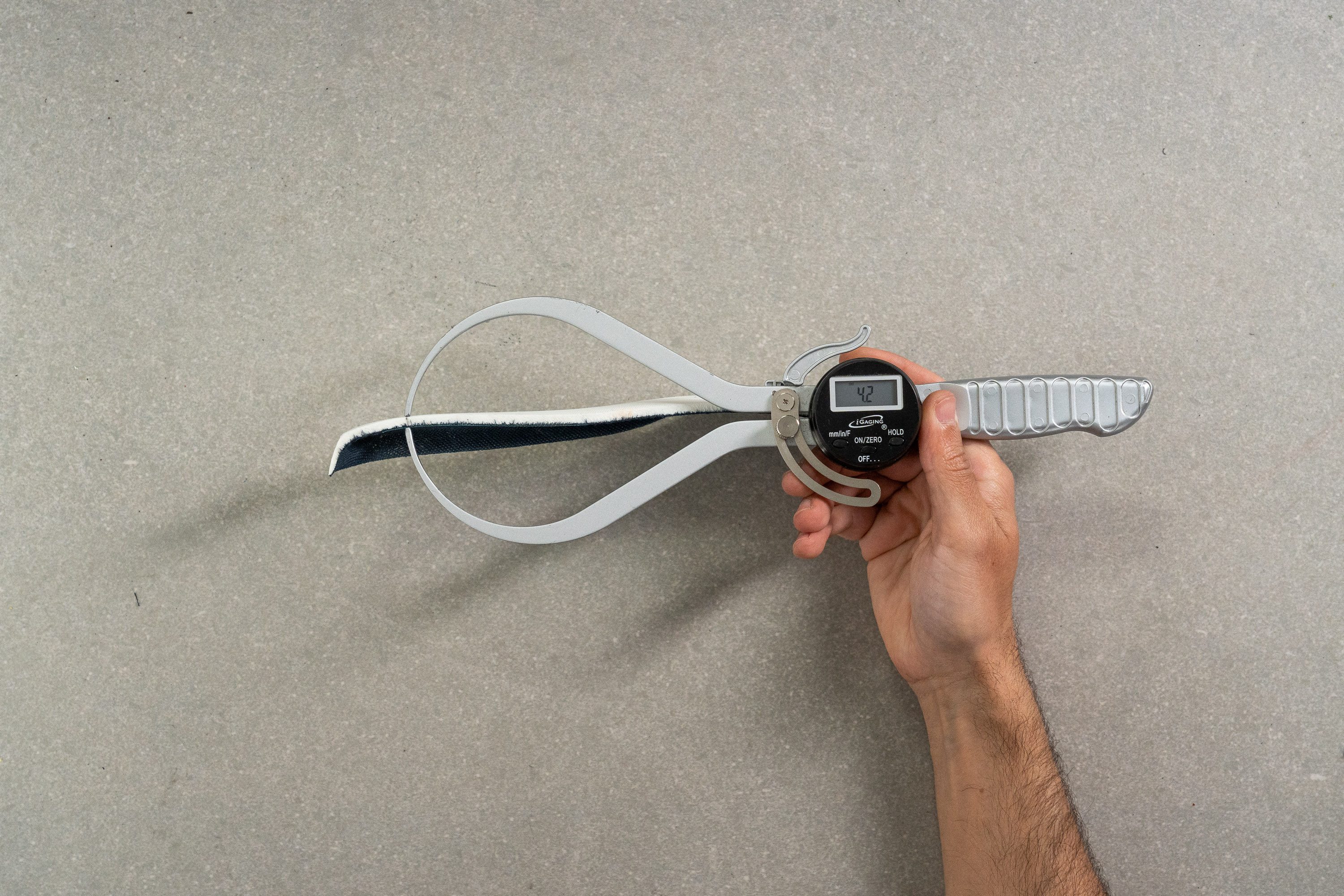
| Hoka Clifton 9 | 4.2 mm |
| Average | 4.5 mm |
Midsole softness in cold (%)
We understand that many of you also train during harsh winters and are curious about the effects of cold in running shoes. Let's see what happens!
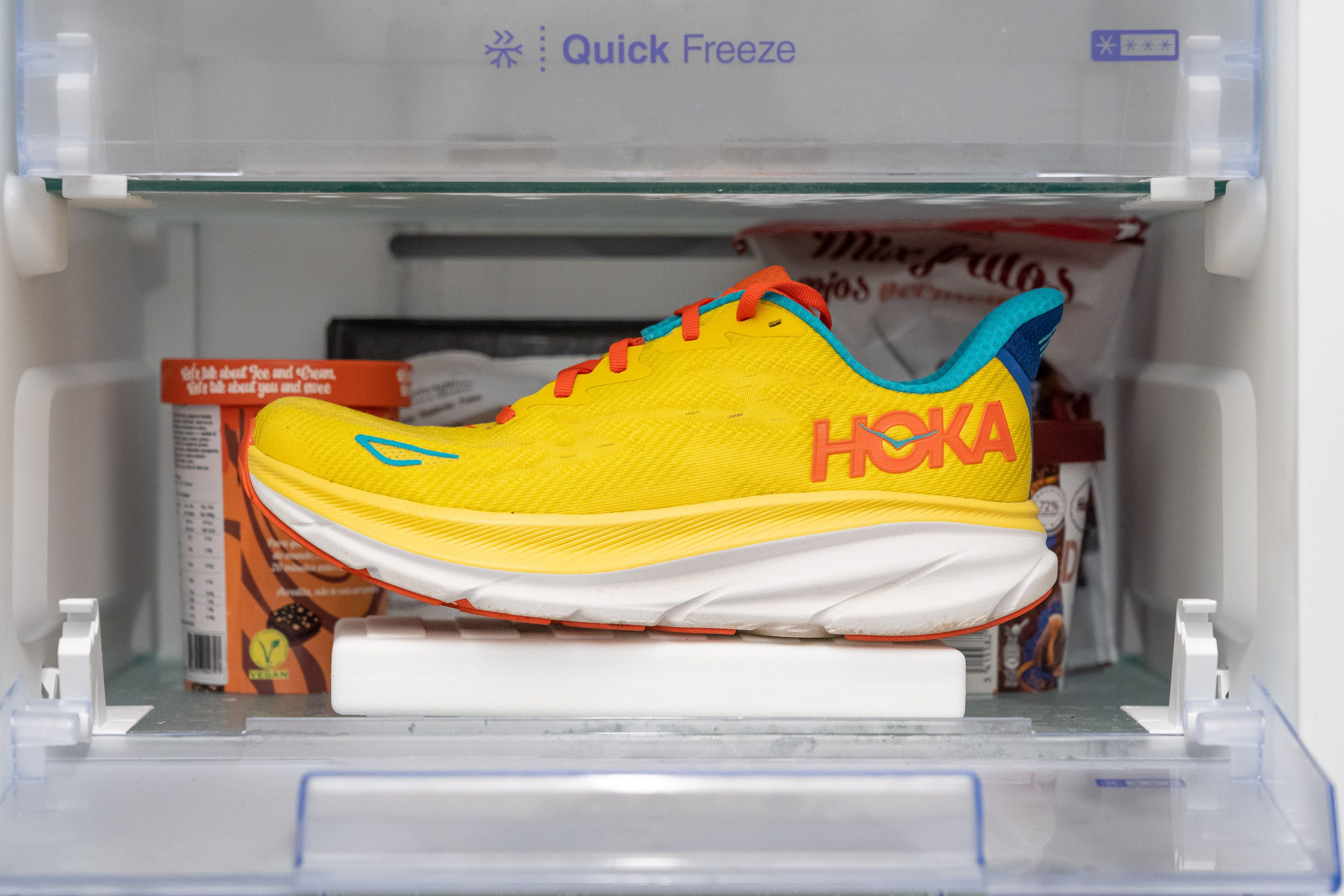
Well... we've got great news for anyone planning to rock the Clifton 9 in cold weather! The ProFly foam barely gets firm at all!
After letting this Hoka shoe chill in the freezer for 20 minutes, we repeated the measurement and got 24.0 HA instead of the initial 20.4 HA. That's a really small difference! And the shoe still remains much softer than the rest of the "frozen" shoes.
The difference in firmness turns out to be only 17.6% for the Clifton 9 whereas the average of road shoes hovers around 28%.
That combined with the shoe's less breathable upper is the green light for using this Hoka shoe on a chilly day!
| Hoka Clifton 9 | 18% |
| Average | 24% |
Tongue padding
We found the tongue to be 6.6 mm thick, which is 38% less padding compared to the previous model, yet 17% more than the average running shoe.
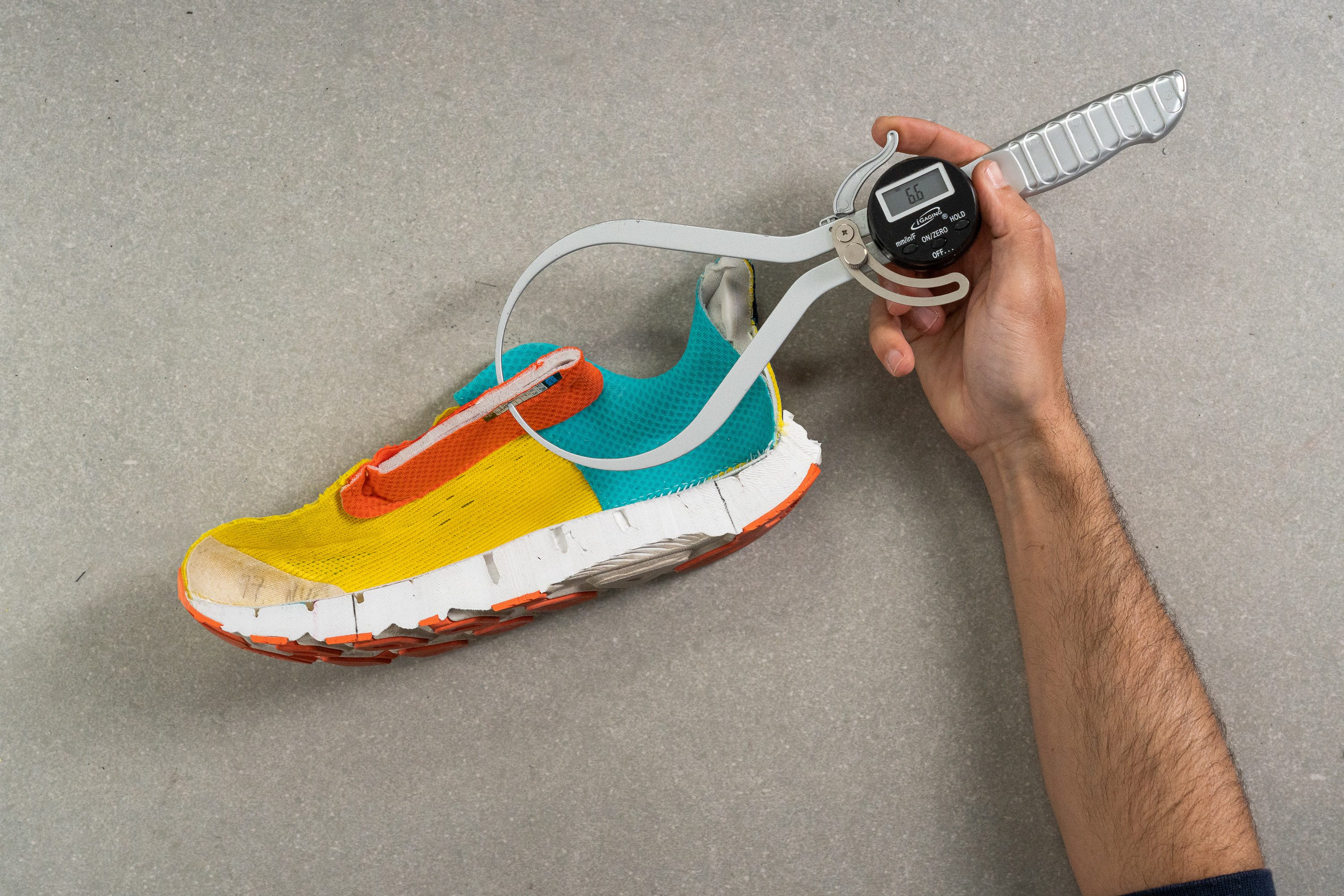
| Hoka Clifton 9 | 6.6 mm |
| Average | 5.7 mm |
Tongue: gusset type
The shoe's padded and semi-gusseted tongue provides a really snug yet comfortable fit.
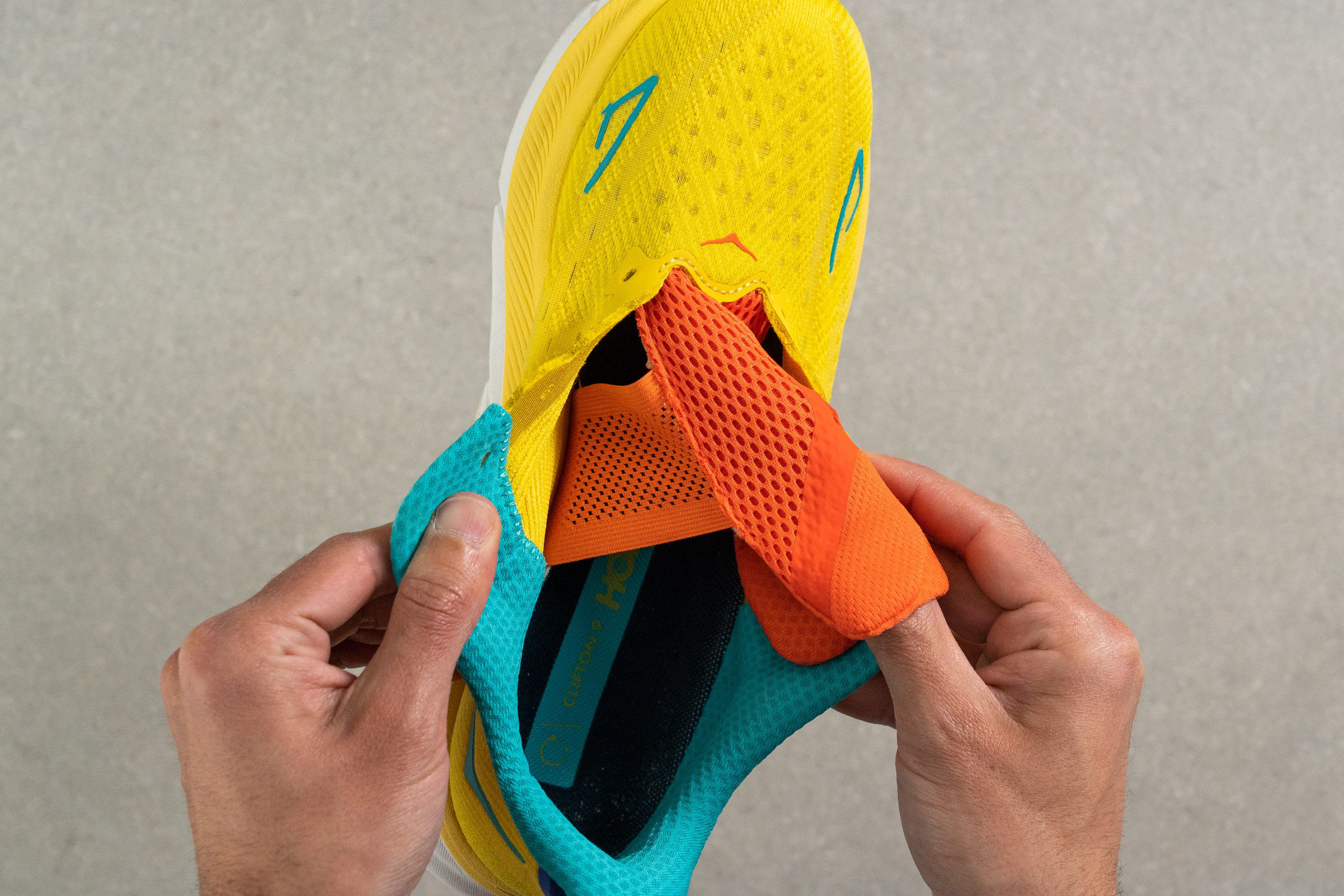
| Hoka Clifton 9 | Both sides (semi) |
Where’d those numbers go?
Another interesting tidbit about the 9th-generation Clifton: the midsole no longer has its ‘specs’ printed on the side; no need to ask Reddit for help in deciphering what they mean.
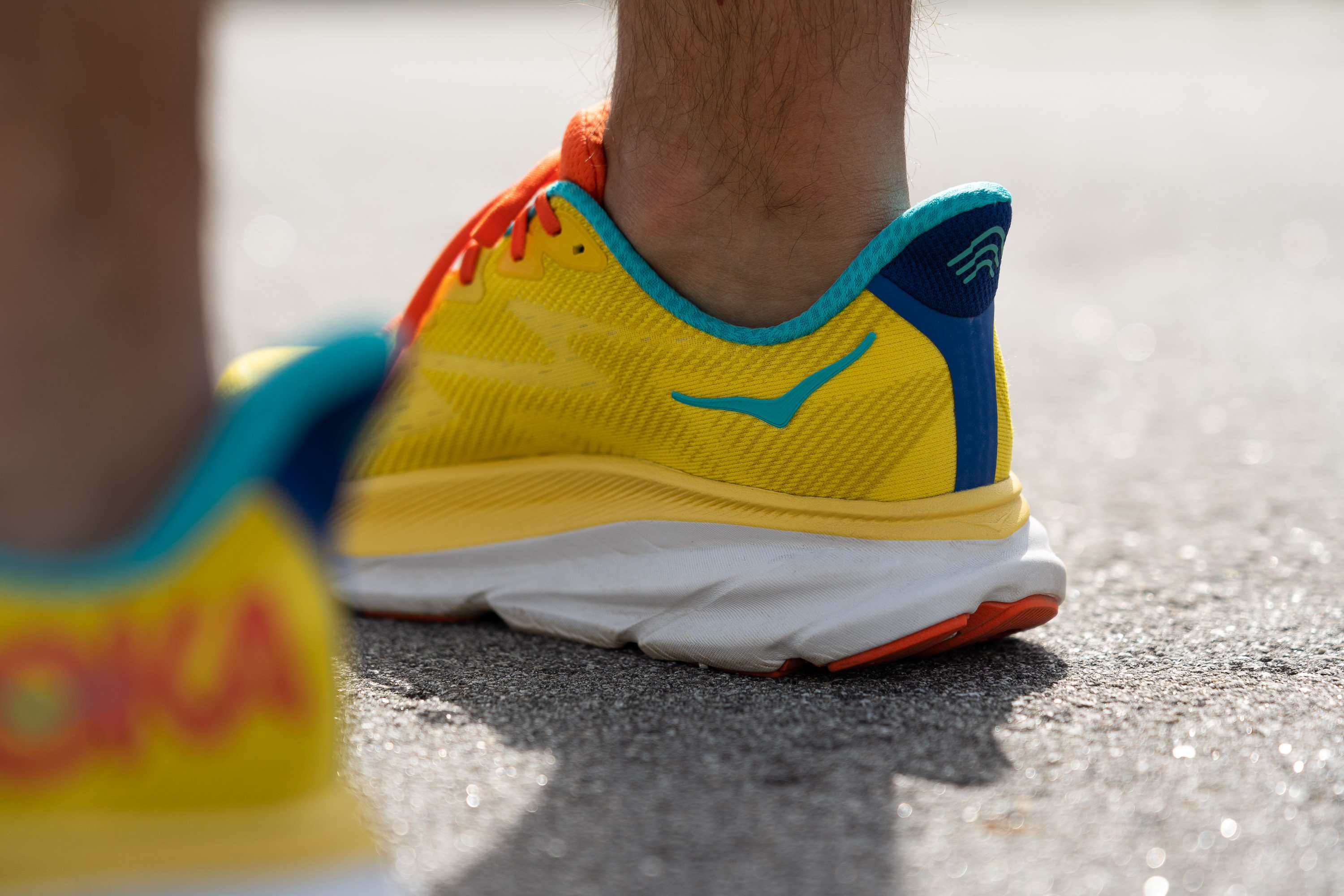
In-shoe comfort
From afar, this upper looks quite similar to the 8. But upon closer inspection, we saw the shoe's knitted textured upper to be more durable, and accommodating.
This thicker material also provided a secure lockdown that felt especially good when turning.
What's more, Hoka is a highly-regarded brand in the world of triathlon which translates to the Clifton 9's incredibly soft and buttery interior. We found that its upper allows for a super comfortable sockless experience during your daily runs. Just remember to limit those ones to under an hour to avoid any blisters or hotspots.
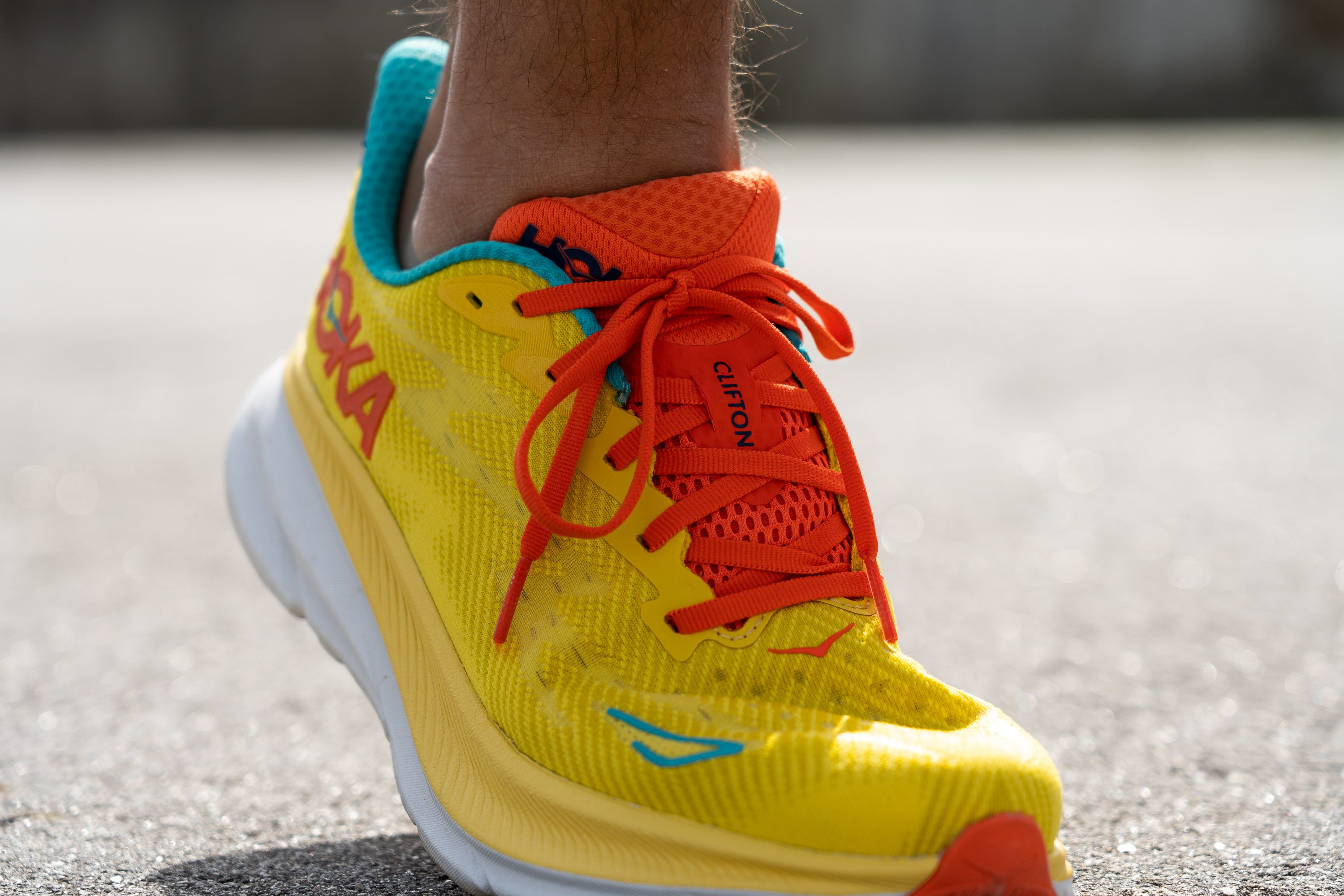
The flat laces might be a bit long for some runners, but this extra length is actually beneficial if you plan on using a runner’s knot.

